ECHOES OF A SILENCED VOICE

THE LEGACY OF MURDERED JOURNALIST PAUL KLEBNIKOV ’ 81 LIVES ON IN MEMORIAL LECTURE SERIES


THE LEGACY OF MURDERED JOURNALIST PAUL KLEBNIKOV ’ 81 LIVES ON IN MEMORIAL LECTURE SERIES
Dave Baker
Class of 1950
Since Grad Donor Society Lion Rampant Society Heritage Circle Class Agent

We are inspired by the steadfast commitment, generosity and leadership of Exonians like Dave.
Exceptional Exeter experiences are made possible by the generosity of those who came before us. Alumni who continue to pay their gratitude forward through investments of time and philanthropic generosity demonstrate the true meaning of non sibi.
In June, we invite you to join us in supporting current and future Exeter students who hold the potential to make positive change in the world. It’s never too late to start your own legacy of giving.
Principal
William K. Rawson ’71; P’08
Director of Communications
Robin Giampa
Editor
Jennifer Wagner
Contributing Editor
Patrick Garrity
Class Notes Editor
Cathy Webber
Staf Writer
Sarah Pruitt ’95
Production Coordinator
Ben Harriton
Designers
Rachel Dlugos
David Nelson
Jacqueline Trimmer
Photography Editor
Christian Harrison
Communications
Advisory Committee
Daniel G. Brown ’82, Robert C. Burtman ’74, Dorinda Elliott ’76, Alison Freeland ’72, Keith Johnson ’52, Yvonne M. Lopez ’93
Trustees
President Morgan C.W. Sze ’83
Vice President
Deidre G. O’Byrne ’84
Una Jain Basak ’90, Bradford Briner ’95, Wole C. Coaxum ’88, Suzi Kwon Cohen ’88, Elizabeth A. “Betsy” Fleming ’86, Scott S.W. Hahn ’90, Ira D. Helfand, M.D. ’67, Paulina L. Jerez ’91, Giles “Gil” Kemp ’68, Eric A. Logan ’92, Cornelia “Cia” Buckley Marakovits ’83, Samuel M. Maruca ’73, William K. Rawson ’71, Christine M. Robson Weaver ’99, Michael J. Schmidtberger ’78, Peter M. Scocimara ’82, Sanjay K. Shetty, M.D. ’92, Leroy Sims, M.D. ’97, Belinda A. Tate ’90, Kristyn A. (McLeod) Van Ostern ’96, Janney Wilson ’83
The Exeter Bulletin (ISSN No. 0195-0207) is published four times each year: fall, winter, spring and summer, by Phillips Exeter Academy 20 Main Street, Exeter NH 03833-2460 Telephone 603-772-4311
Periodicals postage paid at Exeter, NH, and at additional mailing ofices. Printed in the USA by Cummings Printing.
The Exeter Bulletin is sent free of charge to alumni, parents, grandparents, friends and educational institutions by Phillips Exeter Academy, Exeter, NH. Communications may be addressed to the editor; email bulletin@exeter.edu.
Copyright 2024 by the Trustees of Phillips Exeter Academy. ISSN-0195-0207
Postmasters:
Send address changes to: Phillips Exeter Academy
Records Ofice 20 Main Street Exeter, NH 03833-2460


“PUTTING MYSELF IN A LEARNER’S MINDSET FOR THOSE FIVE MONTHS ... HELPED ME TO UNDERSTAND MYSELF IN WAYS I HADN’T EXPECTED. ”
—page 38


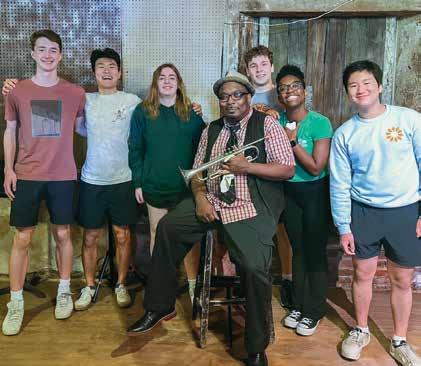
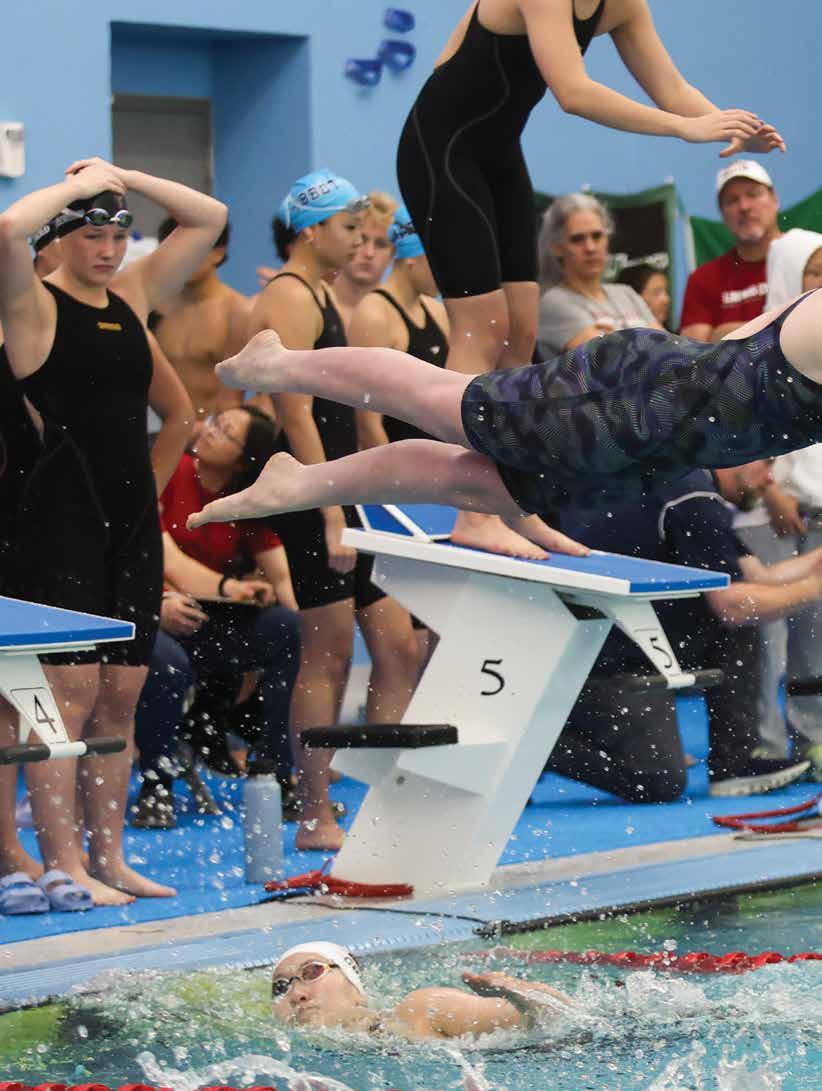

an All-American time of 3:24.70, helping Exeter win the Division I championships.
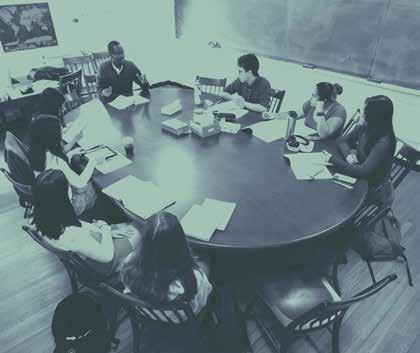


The fascinating story in the latest Bulletin about shortwave station WICOW in 1929 leads me to fll in a gap about the cupola’s history. There was a second radio license at the same site, almost 40 years later.
Station WPEA-FM had a short life in 1964 before being shut down for interference to local television reception. In 1966, student Mark Hutchins ’68 uncovered the station’s mothballed electronics, stowed away in the Thompson Gym, and engaged a Bell Labs engineer to design a special flter that would protect the TV reception and allow the station to be licensed once again.
The new WPEA went on the air in the spring of 1967, with its transmitter and antenna located in the cupola of Amen Hall, and its studios in the basement. I believe the station has been operating “continuously” ever since, given the student schedules and seasonal campus changes. The studio moved at least twice after that, to the former Davis Library and eventually to the Academy Center where it is now located. I’m not sure where the transmitter and antenna are today.
Mark Hutchins went on to a distinguished career as a broadcast engineering specialist, radio station owner and later as an engineering consultant. In 2012, he passed away from diabetes complications, leaving his beloved wife, Norma Willingham. WPEA has launched many careers over the decades since, including my own. —Dave Underhill ’69
We neglected to give credit where credit was due. Aimee ToweyLandry, department coordinator at Phillips Church, captured this beautiful image of the lanterns lining the pathways. The picture appeared in the winter edition of The Exeter Bulletin.
Ihave said many times that Exeter has never stayed strong by staying the same. Last month I attended a student panel at Experience Exeter, our revisit program for newly accepted students, and was struck by how much actually does stay the same. As I listened to current students describe their Exeter experiences, I couldn’t help but notice the similarities to my own. They expressed it diferently — I’m certain I never praised my faculty adviser as being “super chill” — but the students today value the same things many of us valued most during our time here. Close friendships. A strong feeling of belonging and community. A sense of purpose and meaning in contributing to the life of the school. A strong belief in the beneft of learning with and from diverse peers through Harkness. And certainly, joy and satisfaction in aiming high in academics, athletics, the arts, cocurricular programs, community service and everything else that our students do.
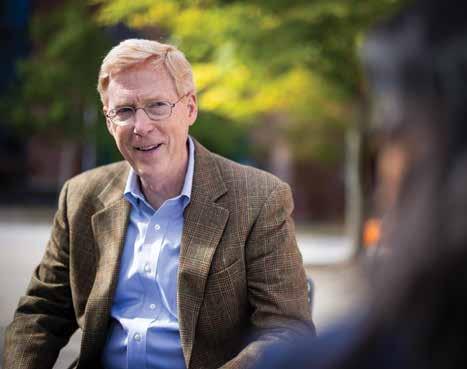
Our mission as a school has never changed — we seek to unite goodness and knowledge and inspire youth from every quarter to lead purposeful lives. Each phrase can be traced to our Deed of Gift, written in 1781. We are steadfast in our belief that knowledge and goodness together lay the surest foundation for usefulness to humankind. We are unwavering in our commitment to academic excellence, and to rigorous inquiry and thoughtful discourse in pursuit of complex truths. That commitment remains core to our identity as a school and central to our Harkness pedagogy. It informs how our students learn and grow outside as well as inside the classroom.
Our commitment to youth from every quarter is now more fully realized by the adoption of our need-blind admissions policy. Our commitment to socioeconomic diversity has always been a defning strength of our school; the diversity of backgrounds, identities, talents and experiences that results shapes the student experience across all felds of endeavor and is inseparable from our vision for what it means to be an excellent school.
in 1784, refects the conviction of our Founders, to which we hold true today, that an Exeter education should be used for the beneft of others as well as for oneself. We continue to believe that “youth is the important period” to instill in our students the values and personal qualities that will propel their learning and growth and provide the foundation for their service to the greater good.
In the pages that follow, you will fnd ample evidence of our enduring mission and values in the joy our students have in their learning and growth and in the many examples of how our alumni are leading purposeful lives.
Yes, Exeter constantly changes. We are a stronger school because of our evolving academic and cocurricular programs, our extraordinarily talented students and our deeply committed teachers. Yet, at its core, Exeter is built on the mission and values that have guided us for 243 years. I hope you take pride, as I do, in the many ways that the our school continues to change and grow — and remains the same. E
One of the overarching goals of the Academy’s Sustainability and Climate Action Plan is to “ensure that every student graduates from Exeter with a fundamental understanding of the principles of sustainability and the issues posed by climate change.” How do we do that? That’s a key concern for Patrick Kelly, who was named the Sustainability Education Coordinator this academic year, following Science Instructor Andrew McTammany. We caught up with Kelly, also an instructor in religion, ethics and philosophy, at the start of spring term to hear more about his role.
What does the Sustainability Education Coordinator do?
The role entails many kinds of work, including the planning of Climate Action Day, working with environmentally focused student clubs, working with my counterpart in facilities management, Warren Biggins, and sitting on a number of committees like the Natural Resources Committee, the Environmental Stewardship Committee and the Curriculum Committee. Getting to work on what teaching in this era of climate change entails, at a school that is taking seriously its commitment to build a more sustainable campus, is exciting. This year has been one primarily of learning. Members of the community who have been integral to this work for years have taught me much about our progress as an institution. Students likewise have shared with me their past and present projects, interests and dreams for learning about sustainability and experimenting with new and traditional modes of addressing ecological problems locally and more broadly.
What personal experiences do you draw upon for this type of work?
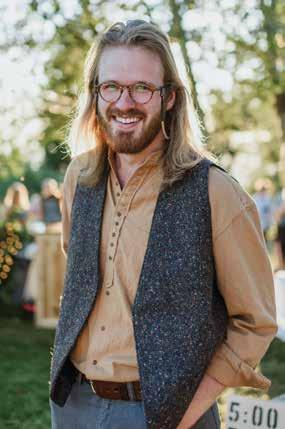
My training has been in philosophical theology and ethics. I am currently working on a dissertation that considers ritual and sacramental traditions as modes of embodied pedagogy that we ought to constructively draw upon as we seek to form ourselves and our communities to meet the ethical challenges of the present moment, with a focus on anthropogenic climate change. This research and thinking defnitely informs my work in the classroom, as well as how I inhabit this role. For instance, though climatic and environmental issues are daunting and seem so far beyond our individual control, I am committed to helping students recognize their own agency to address these problems. This commitment grounded my search for speakers who will come to campus to work with students on Climate Action Day. Alongside my academic connection to this work, I love the outdoors. I grew up as a whitewater boater and was, for a time, a whitewater rafting guide in Colorado. One thing that I enjoy most about PEA is the accessibility of woodlands — I try to get out to them most days to walk my dogs. Being in the woods really transforms my day.
The curriculum is obviously a key component of this work. Tell us about the Green Umbrella Learning Lab course you taught this winter
The course is designed as a project-based learning course focused on sustainability issues on campus, and, as such, it was student-driven in a mode quite unique from Harkness.
We began by engaging with staf, students and faculty to try to understand the issues on campus and then how to address those issues. While initial ideas ranged from aquaponics to a website or app to track emissions on campus and expanding composting, we eventually decided that we could make the most diference by focusing on both lighting and recycling in dorms. To that end the class designed a dorm event where they exchanged lightbulbs in dorm room lamps with more efcient LED bulbs and played an educational recycling game with students.
This course as it unfolded really leans into the best of PEA: It allows students to take the lead in addressing issues that matter to them and our community, and it enables them to teach their peers beyond the classroom space.
What are you really excited about?
At present, I am most excited about the student projects that are in the works and that I have the joy of getting to support. There is currently a project on permaculture gardening in the planning phase, which will hopefully be planted on campus sometime this year. There is also a group of students working to establish a small aquaponics setup in the science building, which I think is quite exciting.
What are some short-term goals?
I am aiming to garner a more robust grasp on the content regularly being taught across disciplines relating to sustainability, so I can assess what, if any, gaps are present. During this year, in part related to my work on the Curriculum Committee, I have been in conversation with scholars at Harvard and MIT who are innovators in sustainability education. Additionally, these conversations have focused on how we must adapt teaching in a time of climate crisis in order to equip students for success. Insights from these conversations have directly impacted my teaching. My hope is to bring these insights more formally to colleagues next year.
Do you find connections between your two roles, instructor and Sustainability Education Coordinator?
The connections between my work in religion, ethics and philosophy (REP) and that which I do as Sustainability Education Coordinator are many! Questions and ideas explored in REP are enormous questions about identity and purpose, meaning and values. The threats posed to human and other species’ populations, and the integrity of ecosystems, raise similarly powerful, existential questions. The ways we think about and live into addressing issues of sustainability are often, if not always, ethical. The frameworks and robust ethical assessment we teach in REP therefore directly relate to the work I do as sustainability coordinator. Further, the work in both positions demands the cultivation of imagination. To live sustainably in a rapidly changing (at times unpredictable) world requires that we creatively envision new possibilities for energy, transportation, infrastructure. Likewise, REP classes often work to equip students with skills to exercise their imaginations in relation to the powerful visions of the future that we all are fed by various media, religions and cultures to create the kind of future that they truly desire. E
Manager of Sustainability and Natural Resources Warren Biggins shares three progress points made since the plan was unveiled a year ago.
Over the past summer, 86 geothermal wells were drilled under the Academy Lawn. These wells will be connected to ground-source heat pumps and ultimately provide heating and cooling to the new dining hall and the Academy Building. Fourteen additional wells will also be constructed during the coming renovations to Davis Library, bringing the campus total to 263.
Facilities management has contracted with Rist-Frost-Shumway Engineering and The Green Engineer to develop a road map to meet the plan’s 2031 emissions reduction goal (75%) and outline potential pathways to reach the 2050 zero carbon emissions goal. This in-progress study primarily focuses on strategies to reduce the consumption of natural gas in the central heating plant via the adoption of heat pumps — both air-source and ground-source (geothermal) — to heat and cool our campus buildings. The study is also examining emerging technologies like alternative fuels and carbon capture and will determine if they play a role in meeting our ambitious goals.
We are investigating an opportunity to install a large-scale on-campus solar array in the Academy Woodlands near Phelps Stadium. PEA is collaborating with ReVision Energy and Unitil in an interconnection study, which will ultimately help determine the size and cost of the array.
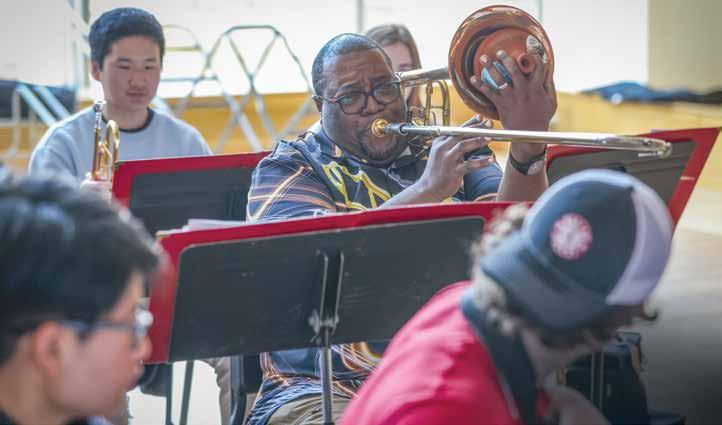
Awarm, brassy timbre spills out of Assembly Hall, echoing down the Academy Building corridors to welcome arriving students, helping them shake of the chill of a frigid February morning. On stage, far removed from their usual of-Bourbon Street haunt, the Preservation All-Stars sail through a handful of jazz standards, pausing only briefy to set up the next number.
“This is an old song,” band leader and trumpet player Kevin Louis says in a Southern croak before the group launches into the up-tempo tune with a call-and-response chorus. “It’s called ‘Down to New Orleans.’ It’s perfect to think about because y’all got this cold weather.” The refrain, “Why don’t you go down to New Orleans?” was prophetic for some in attendance. The Academy’s jazz ensemble returned the visit in March to perform throughout the Crescent City and watch the group play at their
musical home, Preservation Hall.
Founded in 1961, Preservation Hall has become a landmark in New Orleans’ French Quarter neighborhood. The space, and its band, a rotating roster of dozens of performers, has become synonymous with the New Orleans jazz sound.
Operating as a six-piece setup on this morning, the group closes the set with a second-line recessional, a free-wheeling, upbeat jazz style commonly performed in a parade as part of funerals within Black communities of New Orleans. The music continues as students bound toward their next engagements.
A short time later, the musicians proceed to the Forrestal-Bowld Music Center where they sit in with the jazz ensemble under the direction of Music Department Chair Marcus Rabb. The session starts as most in “The Bowld ” do with a cacophony of tuning instruments. The
All-Stars fnd seats among the students as Rabb sets the tone for the class period.
“So today, we’re just going to play some tunes,” he says, “and if at any point our visiting friends want to chime in, they can do that.”
It’s the last rehearsal before the jazz ensemble’s winter concert and the All-Stars’ presence and guidance provides an extra level of excitement. “They’re tired of me,” Rabb says with a smile.

Sheet music pages turn in unison and with a “one, two, ah one, two, three, uh” the ensemble launches into Milt Jackson’s “Reunion Blues.” After one run-through, Rabb pauses to work with the saxophone section on the song’s signature rif. All-Star saxophonist Clint Maedgen jumps in and wails through the notes on repeat. “You see where he’s putting those accents?” Rabb bellows as he motions for the students to join in. Mari Watanabe uses the momentary break to instruct Elaine Qiao ’25 on the piano. “You have to feel,” Watanabe says. “Blues is more one phrase, don’t cut with the measure.”
For Rabb, a jazz trumpet player, the group’s afliation with the birthplace of the genre makes the connection extra special. “Preservation Hall is a community-based organization dedicated to preserving traditional New Orleans music,” he says. “It can’t be overstated that it’s one of the most important American musical institutions.”

After joining the Academy in 2021, Rabb dreamt of partnering with the All-Stars and taking Exeter’s jazz ensemble on tour to the Big Easy. “I fgured it would take fve to 10 years to have a group good enough to do that and we were able to do it in three,” he says. “The universe let me put my plan into action.”
As classes elsewhere in the music building begin to let out, a crowd forms in the large doorway leading into “The Bowld” before people eventually spill into the room and the audience seats. With an eye on the clock, Rabb tries to close out the period before he’s persuaded by the ensemble and onlookers to play through Jon Batiste’s “Freedom” once more. As the students begin packing up Rabb thanks the visiting musicians with a humorous proposition. “I’m going to need you all to enroll as 12th graders,” he says. “You can all live at my house.”
The All-Stars’ residency is made possible by a fund established in 1998 by Jane and Clint Gilbert ’47 that supports students’ pursuit of music through lessons, providing instruments and the Gilbert Concert Series, which brings renowned musicians to campus for performance and instruction. In addition to their time with the students, the All-Stars play an evening show for Exeter community in a packed Bowld that ends with audience members dancing and swirling around the band.
The collaboration on this day and the students’ upcoming spring break trip to New Orleans is all part of Preservation Hall’s mission. “For us, that’s our goal, to pass this music on to the youth,” Louis says. He and his bandmates were impressed by the students’ level of musicianship and looked forward to hosting the ensemble.
“They’re going to break all their dietary restrictions; that’s frst,” he says. “And I think they’re going to get the idea that the music is not really on the page, just the notes are on the page. But the music, the magic, that’s got to come from inside.”
In the break between winter and spring terms, Rabb, a team of chaperones, and 22 students traveled to New Orleans for a week performing and taking in the cultural sites of the city, including Preservation Hall. “You go into the small, wooden, many-times-fooded building, tucked into the middle of a street like any other, and you immediately feel the joy,” Will Simpson ’24 says about the Hall. “It feels like how people describe the Sistine Chapel or Notre Dame.” The drummer says he was inspired by the All-Stars in the exact way Louis had hoped. “These guys are insanely technically skilled, but they have the understanding that being so technically skilled allows you to spend all your energy being you, and playing in your voice.” E
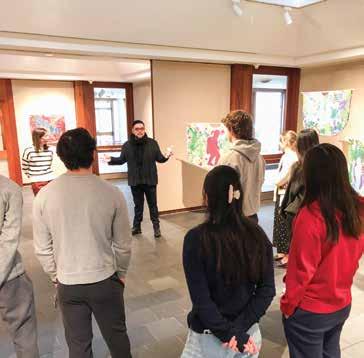
VISITING ARTIST: Hoesy Corona speaks to students about his multidisciplinary art exploring the climate crisis, queerness, immigration and race.
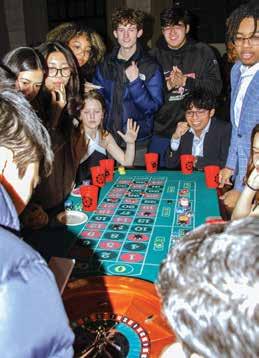

GOOD DOG: This goldendoodle brings all the feels to Study Paws, a furry study break for students at the Class of 1945 Library.
Students, faculty and staf participated in a packed slate of speaking events, panels and workshops honoring the life and legacy of Martin Luther King Jr.

KEYNOTE: “Everyone can love and create a love that would help Black people, but you have to know what folks have been through,” said keynote speaker Tricia Rose, a professor of Africana Studies at Brown.

WORKSHOP: The thumping beat of African music and the rhythm of pounding feet filled the third-floor dance studio in the Goel Center during “Spirit Moves." The workshop was taught by Ethel Calhoun, a teaching artist for Ailey Arts in Education & Community Programs and explored how music and dance has played a role in uniting Black communities in Africa as well as the African diaspora, including the Caribbean and Latin America.
UNSILENCED: Exeter’s social justice showcase featuring student performers energized the crowd with song, rap, dance, spoken word, film and poetry.

The bells ring and, in the hallways of the Academy Building, a mad rush ensues: Students and teachers walking in every direction, crowding the staircases, flling the bathrooms, lining up at the water fountain and holding doors open for each other as they hustle between academic buildings. The school is noisy and active, then returns to relative silence as the next class begins.
The chaos of the passing period is well-known. Remember dashing from Phelps Science Center to the top foor of Phillips Hall? It’s a challenge that Exeter is addressing this spring with the start of a new pilot class schedule that increases passing time to a comfortable 10 minutes. Perhaps more signifcant, the experimental schedule lengthens in-class time to 60 minutes from 50 and reduces the frequency of class meetings to three or four times per week.
These changes might seem small but could make a huge diference in students’ lives. With fewer classes each day, students will make fewer transitions. Refocusing takes mental work, and if one’s brain is still thinking about that math problem from the prior class, it might not be following the conversation about the novel in English. Fewer class meetings per day also reduces the number of homework assignments due the next day. That said, the new schedule does allow teachers to assign more homework per class meeting. The thinking is that students have fewer subjects to focus on each day, so they can concentrate more fully on each assignment.

Considerable time and thought informed each of these choices. Discussions about the schedule, including feedback from students and faculty, began in the spring of 2021. As the COVID pandemic subsided, longstanding concerns about the pace of life at Exeter collided with new awareness of mental health challenges for adolescents. A student survey conducted by Director of Institutional Research Kari Hart in the fall of 2022 found that 71% of responding students reported that they “frequently” or “almost always” feel stressed about their schoolwork or academic experience. The schedule became one of many factors to consider in reducing that stress. Slowing the “pace of life” — the number of required commitments each student has in a day — is an area that the school can control.
Last year, several teachers participated in a smaller version of the pilot, canceling one class meeting every other week and extending the remaining classes by 10 minutes. The feedback from this small group was positive, “but the real beneft of that schedule is actually only realized if you do it for all of your classes,” says Jeanette Lovett, director of studies and one of the administrators overseeing the pilot. Also involved in the planning is a recently appointed Schedule and Calendar Committee, co-chaired by Lovett and Assistant Principal Karen Lassey, and composed of faculty across disciplines. While fnalizing the details of the pilot, the committee has been researching the daily schedule of other schools. Exeter’s experiment has good company: “A lot of peer schools are moving in the direction of longer formats less frequently,” Lovett notes. The committee has also designed surveys, with Hart’s assistance, to administer to students and faculty to gauge

(from top) The 2024 pilot class schedule; a proposed schedule for 2007-08; the 1990-91 schedule
the efectiveness of the new schedule.
This isn’t the frst time that Exeter has experimented with schedule changes. In fact, Lassey was a member of a similar committee in 2006, when the school was pondering ways to reduce the number of Saturday classes. The switch from semesters to trimesters in 1986 precipitated a particularly salient set of schedule overhauls. Classes began to rotate to diferent meeting times throughout the week, and sports were no longer isolated to the afternoons to accommodate multiple teams in indoor facilities during the winter. Over the years, Exeter has tried shorter class periods, double class blocks, rotating weeks, later start times and earlier end times. More recently, the pandemic necessitated several diferent schedules to accommodate the students around the world attending class remotely and social-distancing needs when students were on campus. Being nimble and responsive to a changing world is an important strength for an educational institution.

Pedagogically, perhaps the biggest unknown related to the pilot is Harkness. Ten additional class minutes can feel like a lifetime to teachers and students when the discussion stalls. Many teachers are considering ways to break up the hour-long class with group work, in-class writing or additional challenging math problems. But no one wishes to lose the spirit of Harkness. When the discussion is fowing, the students are talking to one another, and big ideas are emerging — those are magical moments that can happen only with sustained time around the table as a group.
Longer classes may provide more opportunities for that magic to happen. English Instructor Willie Perdomo was one of the teachers who tried the new schedule last winter. Longer class periods “enhanced discussions,” he says. “We were able to explore assigned texts on a granular level. Students had more time to organize their annotations and strategize their entries. With Harkness, a discussion might hit a sweet note toward the end of a class and students often leave such a class wishing they had more time.” In those moments, an extra 10 minutes perfectly capped the class.
Though all classes at Exeter use Harkness, some disciplines may adapt to the change more easily than others. There may be a limit to how much content can be covered reasonably in any individual class or homework assignment. This could be especially challenging for subjects like math, science and modern languages that require a certain level of content coverage to prepare students for the next term. Some departments fear that fewer points of contact
with students during the week will weaken retention, forcing more time to be spent on review. And, the loss of weekly 70-minute classes means that science labs will need to be shortened, although more frequent, shorter labs may also be possible. However, in any discipline with a rigorous amount of content to cover (preparing for Advanced Placement exams, for example), the schedule change may be stressful.
Schedules have changed and class registration, too! Here it is in 1949.
“It’s going to be the frst draft of a model,” Lovett says, and every teacher’s curriculum will need adjustments, even for longtime teachers who have honed their syllabi over the years.
On the other hand, this experiment may lead to further discussions about the nature of learning and the goals of our curriculum. Is the purpose of a course to achieve a large breadth of learning within a discipline, or is the goal to achieve depth in a few signifcant areas, even if fewer topics are covered? How can we best prepare our students for college and beyond?
Though educators may disagree on the answers, the spring term pilot will provide an opportunity for students and faculty alike to ponder these questions, perhaps during a leisurely walk to their next class during the 10-minute break. “Any advances in pedagogy and community-building require innovation and experimentation,” Perdomo says. This spring, the whole community will weigh in as the experiment unfolds. E
Betty Luther-Hillman is the Lewis Perry Professor in the Humanities and an instructor in history. She has taught at Exeter since 2011 after earning a Ph.D. in history from Yale University.




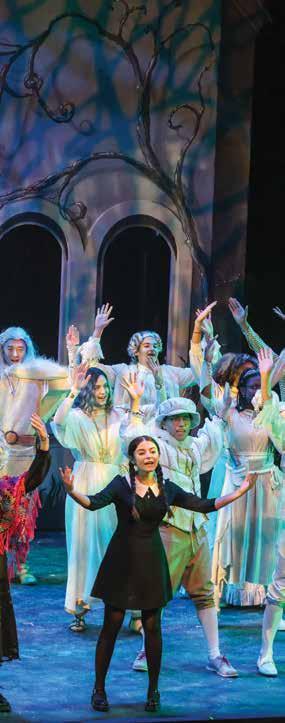
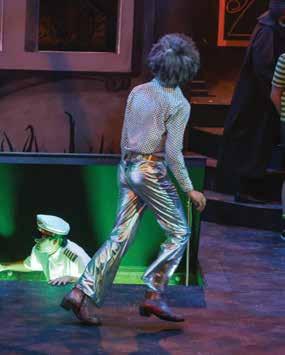


The creepy, kooky story of The Addams Family brought rounds of laughter to The Goel Center for Theater and Dance this winter. Chock-full of catchy tunes (played by an 11-person orchestra) and loveable, quirky characters, the musical comedy celebrated the weirdness found in all of us.
“The Addams Family holds a cherished place in my heart, from endlessly re-watching the movies to humming the iconic theme song since childhood,” says Director and Chair of the Department of Theater and Dance Lauren Josef. “This musical weaves together the eccentricities of each family member, reminding us that our families shape us, whether we like it or not.” Her hope for the audience was that they would “reach out to your own family, celebrating the diferences that make you who you are and cherishing the bond that unites you.” E

Pianist and Instructor in Music Jacob Hiser collaborated with Hugo Shinn ’27 on violin during this winter’s soloist concert in “The Bowld.”
The Other Side winter dance concert featured faculty and student choreography.


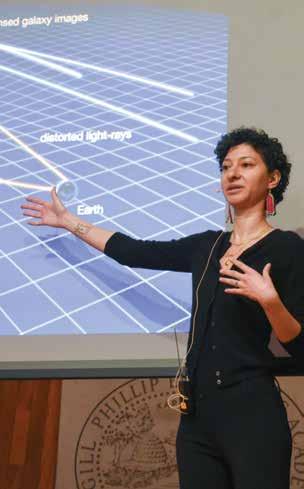
Paul Yoon ’98, writer, author of The Hive and the Honey
“The fun, magic, beauty [and] joy of fction writing is that you have this cool Venn diagram situation, where you can take things that are so far removed from your life, but then also bring in emotionally autobiographical elements. Once those two things merge, that’s where the magic happens.”
Andrew Yang ’92, entrepreneur, former presidential candidate
“When I was here at Exeter … it felt like failure was going to be lifeending. But you all are better situated to fail and then fail and then fail again, and then succeed, than just about anyone else in this country. The question is, what are you willing to fail for?”

Chanda Prescod-Weinstein, physicist, writer and activist
“We as a species evolved under the night sky. That means that we are a storytelling species for whom the night sky is part of our story — it’s part of what we do, it’s part of how we relate, it’s part of our humanity. So to be cut of from the night sky is to be cut of from our humanity.”
Zoe Brennan-Krohn ’03, attorney at the American Civil Liberties Union
“The line between disabled and non-disabled is neither bright nor objective, nor static. It refects society’s norms and values, what range of conduct and ways of being we deem normal and what deviates too far from that. For each person, the line between disability and ability is fuid, with no promises.”

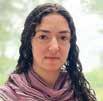
Kim Shively, performing arts professor at Elon University, intimacy educator and choreographer
“I’m interested in how we can create a consent-forward culture where you can establish and articulate your boundaries and you can have tools that help you do that even when they change. Because they change.” E

Achyuta Rajaram ’24 remembers standing onstage at the award ceremony for the 2024 Regeneron Science Talent Search, convinced he wasn’t among the top 10 fnalists. Then the announcer opened the frst-place envelope and read Rajaram’s name. The four-year senior from Hopedale, Massachusetts, defed his own expectations — and took home $250,000 — by developing an automatic method to recognize which parts of artifcial intelligence computer models make decisions.
Founded in 1942, the Regeneron Science Talent Search is the nation’s oldest and most prestigious science, technology, engineering and math (STEM) competition. Finalists have gone on to win the Nobel Prize and the National Medal of Science, among other honors. Rajaram is the second Exonian in four years to win the top prize. Yunseo Choi ’21 won in 2021 for her project, which focused on matchmaking theory. Rajaram was among three classmates who made the top 40 fnalists this year, besting a robust feld of 300 scholars and 2,162 entrants. Alan Bu ’24 secured 10th place and $40,000 for a math project that gave precise limits on the number of spanning trees — the connecting points of vertices in a graph — that can exist in a planar graph. Riya Tyagi ’24 won $25,000 for her project on using computer vision to investigate how AI determines patients’ race and ethnicity.
Though Rajaram came to Exeter focused on math and computer science, he has excelled in the science program as well, taking high-level physics and chemistry courses. In the fall of 2023, he was one of eight Exonians who traveled to CERN, the European Organization for Nuclear Research, as part of the group’s Beamline for Schools Competition. Co-head of the physics, chemistry and math clubs, Rajaram also loves jazz drumming, and has played with several small combos during his time at Exeter.
Rajaram started his award-winning project last summer after reaching out to Dr. Sarah Schwettmann, a research scientist at the Massachusetts Institute of Technology’s Computer Science and Artifcial Intelligence Laboratory. “Computer models are primarily data-driven … which gives them immense fexibility and power to adapt to new problems and solve them consistently,” Rajaram says. “But we don’t really know what happens between the inputs and outputs of these models.”
He describes his project as “dissecting” the models, the way a biology student would dissect an animal in the lab to learn about its anatomy. “If you give these models certain image inputs,” Rajaram says, “there are clusters of neurons in the models’ ‘brain’ that light up.” After developing an algorithm to detect those clusters (or circuits) automatically, he tested its efectiveness by removing diferent circuits from the model to understand how they afect the model’s behavior. “In this large, very messy neural network that has a lot of parts, I was able to isolate parts of the model that are responsible for model prediction,” Rajaram says.
Shedding light on how these algorithms “think,” he believes, will eventually help make them more efective, equitable and safe. Rajaram plans to expand his research on AI interpretability with Schwettmann and her team next year, as a freshman at MIT.

The Robotics Club’s top-ranked team, VERTEX, had another thrilling ride at the New Hampshire FIRST Tech Challenge in February, earning a return trip to the FIRST Tech Challenge World Championship in April.
The achievement capped an undefeated season, in which the VERTEX robot won first place in every qualifying tournament the team entered. It also marked an exciting turnaround: At the state competition, VERTEX lost two out of three qualifying and eliminationround matches by the smallest of margins. But when it came time to hand out awards, the judges nonetheless honored VERTEX with the Inspire Award, given to “the team that best embodies the ‘challenge’ of the FIRST Tech Challenge program.” The top award guaranteed VERTEX a berth in the world championship for the second straight year.
Team VERTEX also took home the Promote Award for creating a compelling video message for the public that celebrates robotics and STEM. In all, 36
Exonians competed at the state championships in Concord; Exeter’s Team Edge finished in third place, while Avaninder Bhaghayath ’26, a member of Team VERTEX, was named an NH-FTC Dean’s List Award Finalist.
In February, a team from Exeter’s Math Club captured third place in the Sweepstakes round of HMMT, the prestigious biannual math tournament organized by students at Harvard, MIT and other nearby schools. The Sweepstakes represented the top 10 overall finishers at the event, which drew close to 1,000 top-performing high school students from around the world. In the individual rounds, Exonians came up with impressive results, including Oron Wang ’27, who placed 15th in the overall individual category, 10th in the Geometry round and fifth in the Algebra and Number Theory round. Andrew Carratu ’25 placed 17th in the overall individual category and 25th in the Algebra and Number Theory and Combinatories rounds. In March,
Carratu competed in the Romanian Master of Mathematics, finishing 10th in an international field of 80 competitors and capturing a silver medal.
Though Emma Sordi ’25 embraces the team spirit of Parliamentary debating, she’s learning fast what it’s like to stand out at the individual level as well. In November, Sordi and three other members of the Daniel Webster Debate Society’s advanced team — Joonyoung Heo ’25, Adrian Mittal ’25 and Josh Grewal ’25 captured first place at a tournament held at St. Paul’s School. A month later, Sordi qualified for the World Individual
Sordi
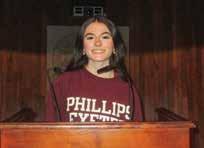
Debating and Public Speaking Championships with her highscoring performance in both team and individual events at a tournament held at Buckingham Browne & Nichols. As a result, Sordi headed to Canberra, Australia in April to compete in the categories of debating,
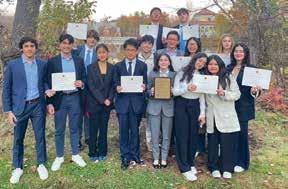
persuasive speaking, interpretive reading and impromptu speaking. This is the first time Exeter has sent debaters to the global stage in consecutive years: Colin Jung ’24 emerged as a grand finalist at the 2023 event, finishing fourth overall in the debating category. “Having Colin has been an amazing help,” Sordi says, adding that the advanced team has been stepping up its training, with three practices weekly and regular Zoom meetings during the summer and vacations. “It’s been a good year for the Daniel Webster Debate Society, and I hope to continue that.”
Exeter’s always outstanding Mock Trial Club sent three teams to the state Mock Trial Championship at the University of New Hampshire
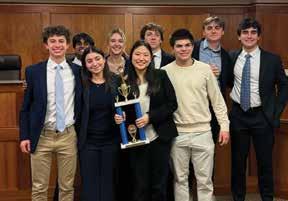
Law School in Concord. All three teams placed in the top four at the tournament. In the finals, Exeter’s A Team faced of against a team from Bishop Guertin High School and won all five ballots, finishing more than 65 points ahead of their competitors. This was the first time in 10 years that any team had won all ballots in the final round of state competition.
At the individual level, Colin Jung ’24 and Sophie Wagner ’25 both won “Outstanding Attorney.”
The A Team — Wagner, Selim Kim ’24, Ethan Benenson ’26, Kai
Gowda ’27, Tamar Moskovich ’26, Charles Potjer ’24, Chad Smith ’25, Michael Nardone ’24 and Matt Grossman ’25 — will be traveling to Delaware in May to represent New Hampshire at the National High School Mock Trial Championship.
A group of enterprising Exonians traveled to Manchester in midFebruary to complete in the New Hampshire State Career Development Conference of the Distributive Education Clubs of America, a non-profit organization dedicated to preparing students for careers in marketing, finance, hospitality and management. Aubrey Silvestri ’25 placed first in the Principles of Hospitality Category after acing the case study portion of the competition, in which she had to assess a specific business challenge and come up with a solution on the spot. “I was able to get exposure to a realistic situation that piqued my interest of potentially going into business in the future,” Silvestri says. “I really enjoyed working with my Exeter peers and appreciated the guidance they gave me.”
Steven Chen ’25, Dhruv Nagarajan ’25, Lucy Jung ’25 and Elle Perry ’25 triumphed in the team Quizbowl competition, while Chen

and Nagarajan placed first in the Start-Up Business Plan Category and Erin Chen ’25 placed first in the Hotel and Lodging Category.
In December, Meira Wohl ’25 headed to Georgetown, Guyana, to receive an award for a short story she wrote as part of school leaving examinations in her home country of Jamaica, known as the Caribbean Secondary Education Certificate. The trip included meeting with all CSEC award

winners, a tour of the city and audiences with Guyana’s president and minister of education. “It was my first time going to a Caribbean country other than Jamaica, and it was such an honor to be amongst my fellow awardees,” Wohl says.
In April, Northwestern University’s Economics Department and undergraduate students hosted the seventh annual Econ Bowl for high school students around the country interested in economics and its applications. This year’s Econ Bowl saw a particularly competitive field, with 20 teams competing in person and 32 joining virtually. Gradually the competitors dwindled to four semifinalists, before Exeter’s A Team defeated Exeter’s B Team in the grand finale. “The experience was great,” Jack Gordon ’24 says. “It’s exciting to get to pursue our passion for economics on a national scale.” E
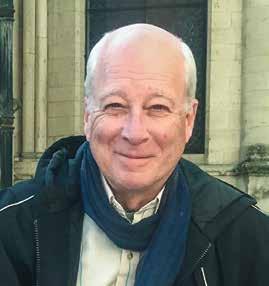
As a preteen son of the U.S. deputy chief of mission in Saigon in the early 1960s, Charles Trueheart ’69 grew up with a unique perspective on America’s involvement in Vietnam. In addition to the infuence of his father, William Trueheart ’35, his godfather, Frederick Nolting, was the U.S. ambassador in South Vietnam during a critical two-year period that led to the overthrow of the Ngo Dinh Diem regime.
In his new book, Diplomats at War: Friendship and Betrayal on the Brink of the Vietnam Confict, Charles Trueheart explores how the difering views of these two important fgures — best friends in graduate school, foreign service colleagues in Paris and high-ranking diplomats — ruptured their friendship forever and mired America ever more deeply into the Vietnam War during the Kennedy years.
Trueheart draws on childhood memories as well as years of experience as a foreign correspondent for The Washington Post to paint an intimate and fascinating picture of political machinations and manipulations at the highest government levels.
We reached out to Trueheart to learn more about his very personal and historical memoir.
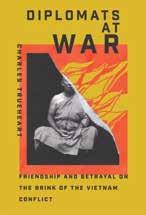
There’s an early scene in the book in which you open a box of Nolting’s personal correspondence and find a thank-you letter you wrote to him as a kid, as well as a copy of his friendly response. How much of this book relies on research? How much was drawn from memory?
This book was mostly research. I have memories, vague memories, of being a 10- and 11- and 12-year-old in Saigon in those days. I knew in real time what was happening politically, and I knew almost in real time what had happened between my father and my godfather because my mother told me. As I say in the book, my father never spoke to me of this at all; it was a kind of big elephant in the room at our house. Fritz Nolting put all his papers at the University of Virginia, which was where I found that unexpected correspondence. There’s a great deal of material of that time out there, many fne books, biographies and memoirs, some of them written immediately after the events in question, others written by a younger generation with a diferent perspective. So I had a wealth of information to work with.
When your mother first told you about what was happening between your father and Nolting, you write, “I was engrossed, bewildered, and began a lifetime of stewing about the whole thing.” Was it those initial sensations that ultimately made you want to write this book and tell this story?
To a certain degree, I’ve been thinking about it all my life. And since my chosen life was as a writer, it seemed like the most obvious thing
“Well, I don’t want to overstate it, but I owe everything to Exeter.”
to do. My mother was very history-minded and understood that she was living through very important times and wrote these wonderful letters that I quote at length. In a sense, almost from the time she frst told me the story, it’s had some kind of hold on my imagination. When I retired as director of the American Library in Paris in 2017 I had the luxury of researching and writing this book.
You mention that your dad told you that Exeter changed his life. What do you remember about your own Exeter years?
Well, I don’t want to overstate it, but I owe everything to Exeter. Certainly, I learned how to write at Exeter, which was a lifelong blessing. My senior year was the frst year that seniors with a certain grade point average had the chance to do an of-campus internship in the months before graduation. I was involved with Phillips Church, and I had this idea that I might become an Episcopal priest, so the school minister, Rev. Edward S. Gleason ’51, arranged for me to have an internship at two churches, St. John’s Church in Washington, D.C., and Christ Church in the town of Exeter. And instead of having me write a term paper, he said, “Write me letters about what you’re going through, like keeping a diary.” Another priest saw the letters and said, “These are very good,” and gave them to a friend at Houghton Mifin. They were published as a book, Kyrie — Letters to a Friend. So Exeter not only taught me that I wanted to be a writer, but the only other book I’ve published was a book written while I was at Exeter.
Your new book is quite an incisive reminder of how fragile our policymaking can be, relying on a small group of people who may be biased or even inept
To me, what makes the book attractive to read is that these are just ordinary people and the situation is so driven by their personalities. Those involved at the time included Michael Forrestal ’45, Roger Hilsman and Averell Harriman, the “Old Crocodile.” I mean, these are fesh-and-blood people who don’t necessarily know what they’re doing and they’re learning on the job. To me, that’s what’s fascinating, capturing the vulnerability and tremendous imperfections of these people, my father included.
Was it dificult to be objective in writing about your own father?
As a journalist and a historian, I had to be especially careful not to seem biased. Certainly, I gave my father less beneft of the doubt than he might otherwise have gotten from me. But one of the things I was determined not to decide in the course of writing the book was who was right and who was wrong, but to really understand why the two of them felt the way they did, and how they could have had this unbelievable misunderstanding at this important moment in their lives, a misunderstanding so great that they took it to their graves. While I don’t think my father ever felt any consolation for the point of view he had, he didn’t seem at all like a bitter man. But he certainly did everything he could to talk me out of becoming a foreign service ofcer — and was delighted when I became a journalist. E



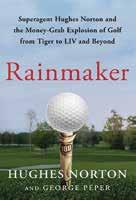



Alumni are encouraged to advise the Bulletin editor (bulletin@exeter.edu) of their own publications, recordings, films, etc., in any field, and those of their classmates, for inclusion in future Exonians in Review columns.
1954—Robin Magowan Lifelines: Poems. (Red Hen Press, 2023)
1958 Bruce Lawrence, with M.A.R. Habib. The Qur’an: A Verse Translation (Liveright, 2024)
1962 George Berger, with Katharina Berger. To Steal a Moment’s Time: A Memoir (Acorn Publishing, 2024)
1965 Hughes Norton, with George Peper. Rainmaker. (Atria Books, 2024)
1966 George Kinder Reflections on Spectacle Pond: The Weekly Edition and The Daily Edition: Spring, Summer, Autumn and Winter. (georgekinder.com, 2023)
1967 Dan Kinder The Crown of Wysdon (self-published, 2023)
1968 Tony Seton Do You Mind? (self-published, 2023)
1969 Michael Fossel, editor, senior writer. Aging: How Aging Works, How We Can Reverse Aging, and Prospects for Curing Aging Diseases. (Academic Press, 2024)
1971 Roland Merullo. Dessert with Buddha. (Pfp Publishing, 2023)
1972 Rob Dinerman. A Century of Champions: 100 Years of College Squash. (Millennium Printing Corp., 2024)
1977 Greg Dale, director, writer. Rules of Living. The bilingual film is being shown at independent film festivals.
1977—Ann Cooper Albright Simone Forti: Improvising a Life. (Wesleyan University Press, 2024)
1982 Christopher Brown A Natural History of Empty Lots: Field Notes from Urban Edgelands, Back Alleys, and Other Wild Places. (Timber Press, 2024)
1987 Chris Warner Rhymes About Nature, Mostly. (self-published, 2023)
1994 Nicholas Weininger, composer. Hakol Hevel (All Is Mere Breath), a cantata. (Navona Records, 2023)
1996 Jasmine Dreame Wagner. “The Storm,” poem. (Los Angeles Review of Books Quarterly, Issue No. 40: Water, 2024)
—“Spell” and “Aubade,” poems. (Notre Dame Review, Issue 56, 2023)
—“When I Was a Child I Hid Inside a Tree” and “Opacity,” poems. (Another Chicago Magazine, December 26, 2023)
2000 Dan Pasternack. Slapshot Sisters: Emma’s New Hometown. (selfpublished, 2023)
2003 Sara Jane Ho. Mind Your Manners: How to Be Your Best Self in Any Situation. (Hatchette Go, 2024)
2006 Dwight Livingstone Curtis. “Keno King,” short story. (New Ohio Review, 2023)
L.J. Cooper. “Alchemy of the World: André Breton and Hector Hyppolite’s Otherworldly Revolution,” article. (Modernism/modernity, 2024)
—“Parapoiesis: William Blake and Emily Dickinson’s Redemptive Otherworldliness,” article. (English Literary History, 2024)
Kent McConnell “Senator Henry Clay’s Death: A Barometer of Piety and Divided Loyalties in Civil War Kentucky.” The paper was delivered at the Nineteenth-Century Studies Association’s national conference in March 2024.
Chelsea Woodard. “Luna Moth” and “Heron,” poems. (Blackbird, Flight v22n1, 2024)
—“In the Matter Of,” poem. (In the Tempered Dark: Contemporary Poets Transcending Elegy, Black Lawrence Press, 2024)
Buzzer-beaters, focused trainings and jovial pick-up games: Love Gym’s hardwood has been the scene of all the joy, sweat and tears that make the game of basketball great. But the hallmarks of a great program are the relationships forged of the court, during bus rides and lifting sessions, that endure long after graduation.
We checked in with three Big Red alums — Greg St. Jean ’09, Josh Bartelstein ’09 and Duncan Robinson ’13 —

who have remained connected and humble while rising through the ranks of professional basketball.
“What makes the Exeter basketball experience so special is that it starts on the frst day you are on campus and it lasts a lifetime,” says St. Jean, who is in his frst season as an assistant coach with the NBA’s Phoenix Suns. “From the moment we stepped on campus, our coaches preached to us the importance of how we carry ourselves and ingratiate ourselves. They challenged us to take pride in everything we do, show maturity and be someone the student body can rely on. The program is made up of high-character people with high aspirations to be successful in whatever they do.”

with the Los Angeles Lakers, who won the league title in the 2019-2020 season, and the Dallas Mavericks before joining his Exeter teammate, Bartelstein, in Phoenix this season.
Bartelstein was a walk-on player at the University of Michigan who rose to team captain. He started his journey in the NBA as an ofce assistant, spending eight years with the Detroit Pistons. Last year, at 33, he became the league’s youngest CEO, overseeing business operations for both the Suns and the WNBA’s Phoenix Mercury.
Robinson played at NCAA Division III Williams College before jumping to Division I Michigan and serving as team captain. He played in two NBA fnals for the Miami Heat and recently became the fastest player in league history to connect on 1,000 3-pointers, doing so in just 343 games.
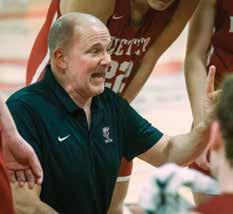
(clockwise from top) Duncan Robinson ’13 taking a jump shot; coach Jay Tilton; and Josh Bartelstein ’09, Greg St. Jean ’09 and Mitchell Kates ’09.
St. Jean, who was a three-year captain at Wesleyan University, entered the NBA as a video coordinator for the Sacramento Kings in 2013. He then held coaching positions
“I am insanely lucky, fortunate, blessed — I could use any of those words to describe it,” Robinson says of his voyage through basketball.
“We are all so fortunate to be part of a game for our profession. You have a propensity to start to think that this is normal and this is just what life is. I always try to challenge myself and take a step back to be grateful and appreciative of the journey and experiences I have had.”
Jay Tilton, Exeter’s varsity basketball coach, says: “These guys cannot be sold short on their talent but I have always admired their tenacity, perseverance and
self-awareness. They have never taken an opportunity for granted and they are all the type of people who have the ability to bring the best out of their teammates.”
The success of others has been both an area of strength and an important aspect of life for Bartelstein, St. Jean and Robinson. “When you are part of a team, you are a part of something bigger than yourself,” Bartelstein says. “As a walk-on captain who did not play a lot of minutes for a Michigan team who went to the national title game, I needed to know something about leadership, building culture and connecting teams. If we were going to be good, I needed to fnd ways to push my teammates and empower them to lead to be at our best. These are things I think about every day in my current role.”
Robinson adds: “As a young player, you are obsessed with just trying to stick in the league, fnd a role and fnd your way. Now in my sixth year, I’ve shifted to being a mentor and leader for guys. It’s the ultimate compliment to me and it’s a responsibility I am excited to embrace. It’s made the day-today more than whether my shots go in, but what can I pour into the team and organization on a given day?”
Though their careers have taken them to diferent areas of an NBA arena, the three are woven into the tradition of Big Red basketball, a network that is entrenched in a supportive culture and mutual respect.
“Our program has been fortunate to enjoy some real tangible results over the years,” Tilton says. Big Red won their ffth Class A title in March by toppling Andover 60-42 in the fnals. “But the success we’ve had is all progression. It’s really humbling to look back at the efort and commitment of past players and how so many of them have remained a huge part of our program.
“Our current players have witnessed frsthand how connected past players remain to each other and to our current team. What I’m most proud of is how those connections have continued to grow and how much Exeter basketball alumni continue to support and take pride in the program today.”
Big Red alumni often return to Love Gym to work out with the team, they send videos ofering congratulations and good luck, and they connect around the globe to catch up and reminisce. They remember when coach Tilton would bark about not buying celebratory jackets for a regular-season win, and when the coaching staf gave them “humble pie” T-shirts ahead of Thanksgiving break as a reminder to not get ahead of themselves.
Although St. Jean, Bartelstein and Robinson have found professional success, it is relationships that they have built over the years that form the core of their ethos. “To this day some of my closest friends and closest relationships I have are with some of my teammates from Exeter,” Robinson says. “It is fun to reminisce, but it is even more enjoyable to follow what we have all done in totally diferent spaces. Some of us are still in basketball, some are crushing it in the corporate world or with entrepreneurial endeavors. But we are a group that have certainly grown through our post-Exeter days together.”
Bartelstein echoes that sentiment, saying, “I would go back to Exeter in a second because my friends I made there have been my friends for life. The way coach Tilton does it is all authentic; it’s truly about building relationships. To think that Greg and I would go work out together every night in the gym — I can remember it like it was yesterday — and now we’re texting about how we’re defending the Cleveland Cavaliers for our jobs.”
“We are always thinking about what it means to build culture,” Tilton says. “How do we want to act, be perceived, and how do we want to grow. The best teams are a collection of unselfsh people who are passionate about what they do and are connected. Nothing is more important to us than extending those connections between our past and present players.” E
In February, the Exeter Athletics Department observed the 38th annual National Girls and Women in Sports Day, a celebration that inspires girls and women to use confidence, strength and character that are gained through sports to become strong leaders in life. Recent Exeter alumni shared why sports are so important to them and how it continues to impact their lives.

Marymegan Wright ’21 Yale, lacrosse
“It’s taught me the values of dedication, of getting up and working hard even when your body aches and you have other things to do, and just really being able to find joy in that.”

Kate Nixon ’23 University of California, Berkeley, rowing
“The biggest thing is that it’s taught me how to bring 100% efort to everything that I do, and that’s beyond athletic competition. I bring my full efort to any extracurricular, to academics, and I think that that’s really valuable.”

Coco Barton ’23 Colorado College, volleyball
“Playing sports growing up gave me a lot of selfconfidence and taught me how to be part of a team. My favorite sports moment would probably be my freshman year winning the NEPSAC championship with my team. Even though then I didn’t play a bunch, it was just awesome to be a part of something so big like that and celebrate with my teammates.”

Scan this QR to hear more from these athletes and others!

BOYS VARSITY SQUASH RECORD: 8-14
Head Coach: Bruce Shang
Assistant Coach: Paul Langford
Captains: Ryan Breen ’24, Neil Varwandkar ’24
MVP: Ian Lanning ’27
BOYS VARSITY INDOOR TRACK & FIELD
RECORD: 1-0
Head Coach: Hilary Hall
Assistant Coaches: Marvin Bennett, Ron Edmiston, Steve Holmes, Stephan Lewis, Brandon Newbould, Xiana
Twombley, Panos Voulgaris
Captain: Solu Ajene ’24, Cordel Epale ’24, Byron Grevious ’24
MVP: Byron Grevious ’24


BOYS VARSITY BASKETBALL
RECORD: 19-5 CLASS A CHAMPIONS
Head Coach: Jay Tilton
Assistant Coaches: Rick Brault, Phil Rowe
Captains: Max Albinson ’25, Tyler Bike ’25, Ryder Frost ’25
MVPs: Tyler Bike ’25, Ryder Frost ’25
BOYS VARSITY SWIMMING & DIVING RECORD: 8-1
SECOND PLACE IN NEW ENGLAND
Head Coach: Don Mills
Assistant Coach: Meg Blitzshaw
Head Diving Coach: Julie Van Wright
Captains: Will Reed ’24, Michael Yang ’24
Swim MVP: Ethan Guo ’25
Dive MVP: Nicholas Limoli ’26


GIRLS VARSITY BASKETBALL
RECORD: 6-17
Head Coach: Katie Brule
Assistant Coach: Kerry McBrearty
Captains: Amelia Byerly ’24, Stacy Chen ’24, Laurie Chung ’24
MVP: Amelia Byerly ’24
BOYS VARSITY HOCKEY
RECORD: 13-12-5
Head Coach: Tim Mitropoulos
Assistant Coaches: Dana Barbin, Brandon Hew
Captain: Jack Gordon ’24
MVP: Brady Quackenbush ’24

GIRLS VARSITY SQUASH
RECORD: 8-12
Head Coach: Lovey Olif
Assistant Coach: Mercy Carbonell
Captains: Gigi Lannon ’24,
Lucy Lukens ’24, Esme Shields ’24
MVP: Tifany Sun ’26

GIRLS VARSITY SWIMMING & DIVING RECORD: 9-0
NEW ENGLAND CHAMPIONS
Head Coach: Nicole Benson
Assistant Coach: Kate D’Ambrosio
Head Diving Coach: Julie Van Wright
Captains: Vedika Amin ’24, Audrey Zhang ’24
Swim MVP: Mena Boardman ’26

GIRLS VARSITY HOCKEY
RECORD: 12-12-2
Head Coach: Sally Komarek
Assistant Coaches: Jim Tufts, Adam Loyd
Captains: Jocelyn Orr ’24, Caroline Shu ’24
MVP: Allie Bell ’25

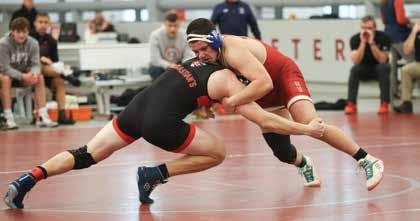
BOYS VARSITY WRESTLING
RECORD: 10-7
Head Coach: Justin Muchnick
Assistant Coaches: Bob Brown, Tom Darrin
Captains: Sebastian Hiller ’25, Alex Rosen ’24, George Varghese ’24
MVP: Sebastian Hiller ’25
PHOTOGRAPHS BY BRIAN MULDOON

RECORD: 0-1

LEGACY OF MURDERED INVESTIGATIVE JOURNALIST PAUL
KLEBNIKOV ’81 LIVES ON IN MEMORIAL LECTURE SERIES
“WE ARE LITERALLY TONIGHT AT AN INFLECTION POINT,” ANDREW WEISS SAYS. “THIS IS A TERRIFYING MOMENT … IN U.S.
UKRAINE.”

Weiss, a former White House, State Department and Pentagon ofcial during the presidential administrations of George H.W. Bush and Bill Clinton, now analyzes the region for the Carnegie Endowment for International Peace, a global think tank. On this February evening, he is addressing not journalists or policymakers, but a group of Exeter students, faculty and staf gathered in the intimate black box theater inside The David E. and Stacey L. Goel Center for Theater and Dance.
The topic of Weiss’ lecture — “War in Ukraine: Can the United States and Europe Tackle the Near- and LongTerm Challenge?” — could not be more timely. Even as he speaks, U.S. Senate lawmakers are mired in contentious negotiations over legislation that would potentially send more than $60 billion in additional aid to Ukraine, where fghting has been raging since Russian forces invaded in February 2022.
Weiss speaks for more than an hour, pausing often to emphasize a point or invite questions from the audience. He argues that for Russia’s president, Vladimir Putin, Ukraine represents “unfnished business” after popular uprisings thwarted Russian intervention in Ukrainian politics in 2004 and 2014. Putin’s relentless eforts to dominate Ukraine, Weiss says, is why the war in Ukraine will govern U.S. policy toward Russia for the foreseeable future.
“We need to avoid magical thinking about how we’re going to manage an adversarial relationship with a country like Russia,” he says, expanding on a theme he and a Carnegie colleague explored in an essay published in The Wall Street Journal last November. “So long as Putin is in power, we should expect the current status quo to prevail.”
This event is the second of three lectures by Weiss, who will also sit in on multiple history classes as the latest speaker in the Paul Klebnikov ’81 Memorial Lecture Series, established by the class of 1981. (See sidebar, Civil Engagement, page 37.) An investigative journalist who had recently become editor in chief of the Russian edition of Forbes, Klebnikov was shot and killed outside his ofce in Moscow in July 2004. Though Russian authorities charged several men linked to a Chechen rebel leader with committing the murder for hire, they never defnitively identifed who had organized it. Almost 20 years later, no one has been brought to justice for Klebnikov’s killing.
Keith Moon ’81, a longtime teacher of Russian history and literature at The Hotchkiss School, introduced Weiss. Moon says he often thinks of Klebnikov when discussing the corruption and chaos of post-Soviet Russia with his students. “Paul was doing investigative journalism and studying people who were ruthless and brutal, and they caught up with him,” he says. “He understood that, but it was a tragic … price to pay.”

A descendant of Russian emigrés who escaped the Bolshevik Revolution of 1917, Paul Klebnikov was born in New York City, the youngest of four children. According to an article published in New York Magazine after his death, he attended private school in Manhattan and spent weekends and vacations at a family home in the Hamptons. Yet he also grew up steeped in the culture of his ancestral homeland, following Russian Orthodox religious traditions and learning the history of the czars.
Andrew Weiss, a former White House, State Department and Pentagon oficial, speaking with students, faculty and staf about the war in Ukraine.
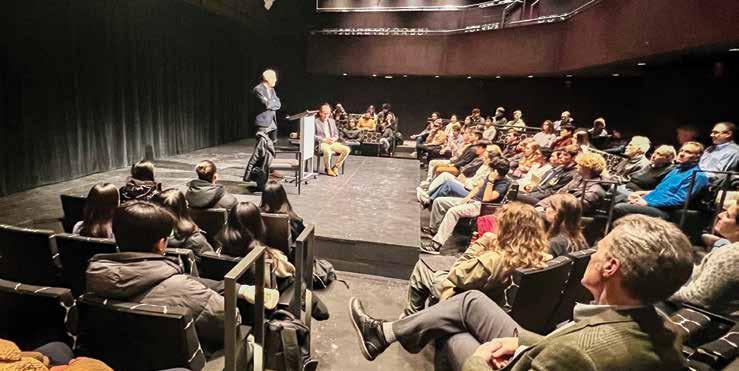
“WE NEED TO AVOID MAGICAL THINKING ABOUT ... AN ADVERSARIAL RELATIONSHIP.”

Andy Bernard ’81, who met Klebnikov when both were 6 years old, remembers their primary school teacher reprimanding Klebnikov for speaking Russian in class. Both boys later enrolled at Exeter, where they moved into opposite ends of Webster Hall. At the time, Exeter’s dress code required a tie, which Klebnikov would often replace with an ascot. “He was just someone who was defnitely on his own path, much more so I think than many of us were at a very young age,” Bernard says.
Ashok Chandrasekhar ’81 forged a close friendship with Klebnikov through long conversations in the cramped quarters of a fourth-foor room in Webster North their prep year, when Klebnikov kept more than one book on great tank battles of World War II on his bookshelf. “Paul was one of the most politically and historically aware people that I knew back then,” Chandrasekhar says. “He very much cared about what was going on in the world, about being engaged with it and taking a position on things. He also enjoyed writing about what was going on, analyzing it and coming up with interpretations.”
Klebnikov and Chandrasekhar worked together on The Exonian, but Klebnikov left during his

upper year when he ran for and was elected president of Student Council. “He felt that the school was full of so many smart, interesting people and so many great teachers and so much opportunity that it could be even better,” Chandrasekhar recalls.
After Exeter, Klebnikov studied political science at the University of California, Berkeley, and got his Ph.D. in Russian studies from the London School of Economics. He began working as a reporter for Forbes in 1989, and by the early ’90s was taking frequent reporting trips to Russia. He was optimistic about the possibility of what Russia could become, even as he reported with horror on the corruption that dominated the era of privatization of state property after the Soviet Union’s fall.
In 2000, Klebnikov published a book, Godfather of the Kremlin, based on reporting he did for Forbes on Boris Berezovsky, a businessman whose dealings in luxury cars, media, oil and other industries had made him one
of the richest men in Russia. After the book’s publication, Bernard — a professor of international economics at the Tuck School of Business at Dartmouth College — invited Klebnikov to give a guest lecture to his students about the Russian economy since the breakup of the Soviet Union and its prospects for the future.
Bernard recalls admiringly how Klebnikov used no notes or teaching aids but stood with his hands clasped behind his back, lecturing and answering the students’ questions. “It was just an amazing tour de force by someone who knows exactly what they’re talking about and was able to really reach a wide range of students,” he recalls.
In late 2003, after enduring a lengthy legal battle with Berezovsky over claims made in his book (the case eventually settled), Klebnikov was ofered the opportunity to move to Moscow and become editor in chief of a new Russian edition of Forbes. He left his wife, Musa, and their three children behind in New York, signing only a one-year contract for the new job. Forbes Russia drew
attention from the beginning, with one of its frst issues featuring a list of the 100 richest Russians, as well as their fnancial details. The list — which included 36 purported billionaires — made waves for exposing so clearly the divide between rich and poor in post-Soviet Russia.
On July 9, 2004, according to news reports, Klebnikov left his ofce after working late and headed toward the metro station in a nearby park. He hadn’t gone far when a car pulled up behind him and someone inside fred four bullets from a 9 mm Makarov pistol at Klebnikov before the car sped away. Hit multiple times, he was still alive when the local police showed up. They put him in an ambulance, but the vehicle lacked an oxygen tank. Slipping in and out of consciousness, he died at a Moscow hospital, where he had been loaded onto an elevator that stalled between foors.
In 2006, Russian authorities charged three men with supposed links to Chechen rebel leader KhozhAkhmed Nukhayev — the subject of Klebnikov’s 2003 book Conversation with a Barbarian — with carrying out Klebnikov’s murder. They were subsequently acquitted in a closed trial. That verdict was overturned, but the alleged triggerman disappeared before facing a retrial, and the case has remained inactive.

“Paul really believed that Russia was on a trajectory to become the kind of pluralistic society that he had hoped it would be, and he was super optimistic,” says Bernard, who last spoke to Klebnikov just a few days before he was killed. “To me, Paul’s death told me exactly how wrong he was.”
“YOU WANT TO TEST WHATEVER BELIEF YOU HAVE.”

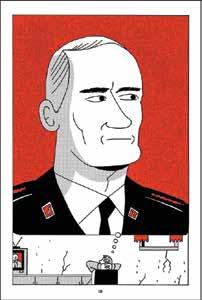
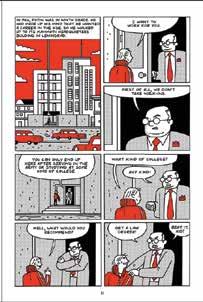
At the time of Klebnikov’s death, about 40 journalists and media professionals had been killed since the Soviet collapse; that number now exceeds 80, according to the nonproft Committee to Protect Journalists. Soon after Weiss visited Exeter, news broke that Alexei Navalny, the most prominent voice of opposition to Putin’s government, had died while imprisoned in a remote labor camp in the Arctic Circle. In March, Putin claimed victory — and another six years in power — in an efectively uncontested presidential election.

“Part of the problem with Russia is there’s no accountability,” Weiss says when asked about the mounting number of journalists, human rights workers, politicians and others who have been killed or died under mysterious circumstances. “There’s lots of conspiracy thinking and theorizing, but there’s no accountability.”
Weiss remembers sitting in the White House as a young policy adviser in 1999 when President Clinton got the news that Putin would become Russia’s next president. In Accidental Czar: The Life and Lies of Vladimir Putin, his 2022 graphic novel biography, Weiss draws on this experience to chart Putin’s rise from a midlevel KGB ofcer to an autocratic president and one of the most notorious fgures on the world stage.
“The Russians created myths about Vladimir Putin to make him seem kind of superhuman and give him all this allure,” Weiss says. “It was important to me in this book to chip away at some of those myths, but also to explain why they’re really important. Because some of them connect back to core aspects of what the Russian state is … [as well as] the current moment and the policies that Russia pursues.”
During his visit, Weiss discussed Russia’s past, present and future with three history classes, including two sections of HIS508: Understanding Violence, War and Peace and HIS554: Revolutionary Russia. He also spoke with the students about his own experience: advanced Russian language studies at Columbia University, studying in the Soviet Union as a college student and making the transition in his career from supporting senior government policymakers to working at a think tank that analyzes Russian policy issues from various angles.
“He was really dynamic and elicited a lot of questions from the students,” says History Department Chair Kent A. McConnell, who teaches HIS508. “I think they respected his ideas greatly, but they were also willing to engage his ideas with questions that were not combative but explored more of his reasoning.”
Hunter Ryerson ’24, a two-year senior in McConnell’s class, admired the breadth and depth of Weiss’ experience in his feld, as well as his openness to difering opinions and his ability to reveal a more complex reality behind the often simplifed narratives presented in the media. “He obviously has some ideological stances … so to say that he showed up and lectured and then I changed my worldview would not necessarily be true,” Ryerson says. But “you want to test whatever belief you have … against a legitimate counterargument. To have quasi-debates and intellectual discussion towards a more productive future is always such a great thing.”
For Sonia Soloviova ’24, a threeyear senior born and raised in Kyiv, Ukraine, news of Weiss’ visit provoked some nervous anticipation. “I was a little worried before he came in … especially with the way Western media portrays the war in Russia and Ukraine,” Soloviova says. “But it was reassuring to hear Andrew Weiss talk about it in such a compelling, empathetic way.”
Compared with many outside speakers, Weiss spent an extended time on Exeter’s campus, including multiple nights of lecturing and repeated classroom visits. “He became kind of integrated into the classroom with this welcoming environment where it became an exchange of ideas,” Soloviova says. “That’s something that’s very common at Exeter between students, but rare when it comes to speakers and students.”
For Bernard and Chandrasekhar, Weiss’ extended visit on campus and multifaceted engagement with students was exactly what the class of 1981 imagined when the speaker series was established in Klebnikov’s memory. “We wanted to bring to the students the kind of thing that would’ve excited Paul when he was a student,” Chandrasekhar says. “Someone from outside of the Academy who could address them about major issues of the day and spend time talking to them and engaging with them in the type of conversation that would’ve thrilled Paul, had he been there.”
In 1979, Klebnikov (then an upper) wrote an editorial in The Exonian lamenting the lack of interest and engagement in current events among his fellow students. As Bernard puts it, “He felt that most of us had a lot of privilege, and he thought that we should use our privilege to change the world.”
During Weiss’ visit, with momentous events unfolding on the national and international stage, current Exeter students clearly took Klebnikov’s message to heart. E
“HE FELT THAT MOST OF US HAD A LOT OF PRIVILEGE, AND HE THOUGHT THAT WE SHOULD USE OUR PRIVILEGE TO CHANGE THE WORLD.”

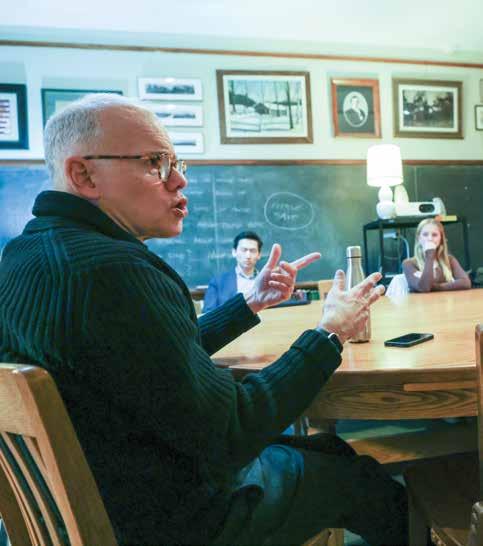

The class of 1981 endowed the Paul Klebnikov ’81 Memorial Lecture Series in 2005 to honor their classmate who was murdered in Moscow soon after becoming editor in chief of the Russian edition of Forbes. According to the deed of gift, the fund is to be used to “bring a speaker to the Exeter campus once during each academic year under the auspices of the Academy’s History Department to address a subject of current relevance to societies in transition.” Its overarching goal is to “challenge the students at the Academy to think about the factors which contribute to the evolution of civil society, and to cultivate the courage, enthusiasm, idealism, sacrifce, curiosity, loyalty and optimism which [Klebnikov] exemplifed in his life.”
At the class’ 25th reunion in May 2006, Jonathan Karp’80 delivered the inaugural Klebnikov Memorial Lecture in Assembly Hall. Then a correspondent for The Wall Street Journal, Karp spoke about his career in journalism, and memorialized Klebnikov as well as his Journal colleague Daniel Pearl, who was kidnapped and killed by Muslim extremists in Pakistan in 2002. “Journalistic courage — often glamorized by a correspondent dropping into a battlefeld — comes rather from the conviction to stand by the facts that we uncover, and to resist intimidation,” Karp told the audience. “If anything, the deaths of Paul and Danny are reminders of the dangers to journalists working well outside of any battle zone.”
Klebnikov lecturers have included Maura Reynolds ’81, a journalist for Bloomberg News at the time, and Tom Gjelten, then a correspondent for National Public Radio. After an extended break during the COVID-19 pandemic, the series resumed this year, and History Department Chair Kent A. McConnell is hoping it can again become an annual or biannual tradition.
“I think it’s incumbent upon the faculty to see this as not only an opportunity for students, but also one for their own professional development to learn more about [other] subjects and perspectives,” McConnell says. He sees engagement with outside experts in various felds as part of what keeps Exeter a vibrant, fexible intellectual and educational community — and not just for students.
“My course on Understanding Violence, War and Peace will look a little diferent next year, I think,” McConnell says. “The readings I select will develop some concepts, not only based on Andrew’s visit, but also based on what history unfolds before us” concerning the war in Ukraine.
As part of its tribute to Klebnikov, the class of 1981 also installed a more permanent memorial for Exeter students to enjoy: a dedicated bench in front of Webster Hall. Andy Bernard ’81 remembers sitting on a similar bench with Klebnikov, his dormmate and friend, for hours on sunny afternoons, talking and observing passers-by. “At the time, those benches weren’t fxed, so you could tilt them back,” Bernard recalls. “The object was to balance moving back on the bench perfectly and then comment on the world going by.” E
 Instructor in English Erica Ploufe Lazure visiting Egypt
Instructor in English Erica Ploufe Lazure visiting Egypt
As I sit at Boston Logan airport Terminal E, waiting on my fight to Munich for spring break, I think about the seniors in my travel writing class, who have spent the past few weeks plotting adventures to far-fung destinations like Chile, Sri Lanka and the Maldives. The fnal project for ENG583: Stranger in a Strange Land invites each student to design a journey to anywhere in the world, with little more than $2,000, a travel buddy and a plane ticket. As I listened to them presenting their big plans during the last week of winter term, I recalled the adventure I’d recently taken for my own sabbatical, and I felt inspired all over again.
In the seven years I’ve taught this English elective about travel writing, ethics and privilege, my students’ plans have included bike riding through Laos, skiing in North Korea and taste-testing jollof rice in Ghana. Some have opted to hike in Patagonia, caravan through Namibia, or visit the still-radioactive remains of Chernobyl. As they fgure out their
(imagined) itineraries, they learn how to set a budget, consider travel logistics and account for safety factors, visa requirements and other limitations. They teach each other by presenting their fndings, enticing us to put new destinations on our collective bucket list.
During our planning stages, I always remind my students about the relationship between what you value and how you spend your money. “When you’re paying your own way, you’ll fnd out pretty quickly what you value most,” I tell them. And the narratives they develop, based on whom they’re bringing, what they’re doing and what they value, never fail to entertain, and inspire: One student, impassioned by lemurs, sought to study them in Madagascar, while another opted to go to London, rent a chaufeured Rolls-Royce and spend a night at the Ritz. Another wanted to see for herself the so-called “snow monsters” in Mount Zao, Japan, while another let a random country generator decide that he’d plan a trip to Azerbaijan.
Beyond the immersive engagement and creativity in planning these trips, what I love most about this project is its capacity to give our students the tools and knowledge for turning their dreams into reality. How do you turn a “maybe, someday” idea into an actual plan?
It’s no wonder, then, that my students inspired my sabbatical in spring 2023, as I endeavored to realize my “maybe, someday” dream to travel around the world. I had experienced the benefts of traveling with colleagues while visiting diferent schools and regions of China in 2012; I had spent 2015 teaching English at School Year Abroad in Viterbo, Italy; and I had just returned from chaperoning the Stratford, UK, program in the fall.
I’d been ready to take my frst sabbatical in March 2020 (I had lined up two writing residencies in Spain and Portugal), but the pandemic lockdown kept me in Hoyt Hall instead, teaching on Zoom and listening to podcasts while baking sourdough bread and growing a vegetable garden. When the world fnally opened up, and I got the OK for my sabbatical in spring 2023, I decided it was time to think big.
“Technically, I’d spent those five months traveling solo, but it rarely
felt that way.
... I felt a genuine sense of community.”
In winter 2022, as my students discussed the ways travel transforms both travelers and the places they visit, I was busy spending my weekends hastily hatching my Boston-to-Boston itinerary. I had plans to be in Seattle in March for a writers’ conference, so the trick was fguring out how to get to Asia from the West Coast on a budget.
Following the literal path of least expensive fights, my itinerary brought me frst to Hawaii, then Japan, South Korea, Vietnam, Taiwan and Hong Kong. From there I went to the Philippines, Malaysia, Cambodia, Singapore and Australia. Then I traveled to Bali, Thailand, Nepal, the United Arab Emirates, Israel and Palestine. The last leg of my journey took me to Egypt, Albania and Germany, with a quick stopover in Iceland. In all, fueled by the Academy’s sabbatical stipend and my own savings and paycheck, I visited 20 countries from March through mid-July, 15 of which I’d never visited before. I returned home to Exeter in August, readjusting to my life on campus, teaching English, advising The Exonian and living in Dunbar Hall.
As far away as I was from campus during my travels, I’d often fnd a tie right back to Exeter. For example, a Japanese woman I’d met on the China faculty trip welcomed me to Tokyo, and we ventured around the city together to see the cherry blossoms. In Seoul, I was surprised to learn that a woman introduced to me through my cousin had sent her sons to Exeter Summer; in Manila, I had a chance to visit and lead a short workshop with the faculty at the Harkness-inspired Beacon School, founded by Mailin Paterno Locsin and her husband and PEA alum, Andy Locsin ’80, thanks to an introduction from their daughter, Adela Locsin ’13, whom I knew when I lived in Wheelwright. In Taipei, I was welcomed by relatives of my PEA colleague Dr. Szu-Hui Lee, and even the language barrier did not diminish a genuine feeling of mutual joy and care. Meanwhile, another Wheelie, Lily George ’14, and I crossed paths twice, once in Seattle and later in Taipei, where she was continuing to study Chinese. And in Singapore, Casey Lynn Siagian, who had participated in the Summer Writers’ Workshop at Exeter in 2013, met me for a lovely afternoon in the botanical gardens.
Sometimes, the Exeter ties were too random to fathom: On a late-night glowworm tour near Sydney, Australia, I was chatting in the dark on the ride back with a young couple, only to realize that I had been the young man’s frst English teacher at Exeter 11 years earlier. (“We planted dafodil bulbs and wrote poems about them,” he recalled.)
Technically, I’d spent those fve months traveling solo, but it rarely felt that way. Between my frequent updates on social media, the books I’d read by authors from almost every country, and the people I met along the way, I never felt alone. I felt a genuine sense of community and connection everywhere.
Lin Chi, for example, invited me to eat a banh xiao on my frst night in Saigon, and we spent the next few days together. Several women doctors on a fight from Manila to Puerto Princesa arranged for my safe arrival to my hotel. A host of friends online ofered to wire me cash when I lost my bank card. When I’d send of another



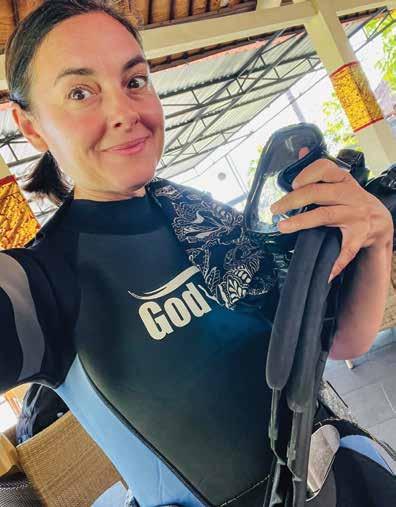
Lazure at the Blue Lagoon in Iceland

Books were an integral part of Lazure’s journey. Here are her picks for each country.
1. Japan
Convenience Store Woman, by Sayaka Murata
2. South Korea
Kim Jiyoung, Born 1982, by Cho Nam-joo
3. Vietnam
The Mountains Sing, by Nguyen Phan Que Mai
4. Taiwan
Two Trees Make a Forest: In Search of My Family’s Past Among Taiwan’s Mountains and Coasts, by Jessica J. Lee
5. Hong Kong
Ghost Forest: A Novel, by Pik-Shuen Fung
6. Philippines
In the Country, by Mia Alvar
7. Malaysia
Map of the Invisible World, by Tash Aw
8. Cambodia
Afterparties: Stories, by Anthony Veasna So
9. Singapore
The Art of Charlie Chan Hock Chye, by Sonny Liew
10. Australia
The Lost Flowers of Alice Hart, by H. Molly Ringland
11. Bali
Eat Pray Love, by Elizabeth Gilbert
12. Thailand
Bangkok Wakes to Rain: A Novel, by Pitchaya Sudbanthad
13. Nepal
Arresting God in Kathmandu, by Samrat Upadhyay
14. United Arab Emirates
The Sand Fish: A Novel from Dubai, by Maha Gargash
15. Israel Tunnels, by Rutu Modan
16. Palestine
Salt Houses, by Hala Alyan
17. Egypt
If an Egyptian Cannot Speak English, by Noor Naga
18. Albania Free, by Lea Ypi
19. Germany About People, by Juli Zeh
20. Iceland
Codex 1962: A Trilogy, by Sjón










“The sabbatical is just that: a pause from Exeter’s daily grind, a chance to recalibrate or strengthen why or how we teach.”



batch of postcards to family, colleagues and students, it felt like some of them were right there with me. In those fve months, I was never truly alone.
The sabbatical is just that: a pause from Exeter’s daily grind, a chance to recalibrate or strengthen why or how we teach, and an opportunity to learn something new. Beyond personal growth, one of the most exciting aspects of this journey was learning more about where many of our students, or their extended families, call home. Before I left, I met with members of the International Student Organization and invited them to follow me on my travels through Instagram (@t.here_and_k.now), and some of them did. Every so often I’d get a short note or recommendation for wherever I happened to be, and I loved sharing my journey with the community.
This past year, it’s been such a pleasure to meet some of our international students or colleagues and be able to chat with them about places they know well. It’s been a privilege to learn about diferent regions of the world by actually visiting them — eating the food, exploring diferent neighborhoods and meeting new people. After my trip, I feel more connected to both my students and colleagues who call these regions home.
When my seniors in English 583 dreamed and planned big, they gave me permission to do the same. Realizing I could puddle-jump my way around the world on a budget, with nothing more than a small carry-on and backpack, and fnd friends along the way, enabled me to experience in real time how connected we all are, or can be. Putting myself in a learner’s mindset for those fve months — being both teacher and student, if you will — helped me to understand myself in ways I hadn’t expected.
Now that I’m back on campus, I feel hardier, more capable and creative. As someone who still dislikes sharks and putting her face in the water, I’m now a certifed open-water diver who encountered a shark in Bali. I rode scooters solo in Vietnam. I got stitches in Dubai. I learned about the history and legends of the Indigenous communities at Mossman Gorge, just outside Cairns, Australia, and tastetested more kinds of fried chicken than I care to admit. (Thailand and South Korea take the win, in a toss-up.) I have a host of new books to introduce to my students in the fall.
When I’m back in my classroom in Phillips Hall, I’m excited to continue to help our community members keep connecting with the wider world and to teach them to be responsible and caring travelers and explorers. As I’ve encountered frsthand, so much of the learning that happens while traveling cannot be taught; you’ve got to get out there and experience it.
While my next sabbatical is still a few years away, the learning continues as I head of to Bavaria for spring break. My plane is boarding. … I must be of ! E
In a memorandum to Principal William Saltonstall dated Feb. 16, 1955, Academy Treasurer James W. Griswold suggested a Leave of Absence Plan. The purpose, he wrote: “In order that certain members of the faculty of The Phillips Exeter Academy may gain additional professional skill and become more profcient in their responsibilities as classroom teachers through study and travel away from the Academy.”
Faculty who had been employed at the Academy for at least seven years would be eligible, he wrote, and a leave would be granted only after a proposal for use of time had been presented and approved by the principal. The time away would be funded by generous donors and the Harkness Leave Fund and would provide individuals with a full salary and reimbursement for travel expenses up to $1,800.
Hundreds of faculty members have taken advantage of the leave of absence or sabbatical program since this letter crossed the principal’s desk. This academic year, 15 teaching faculty members are taking leave for a variety of purposes including restorative time, expanding foreign language fuency and attending professional conferences.
The program has evolved over the decades, but its transformative efect remains constant. What we have learned is that these breaks are crucial to maintaining excellence. They help keep our instructors engaged in their teaching practice and ofer them the critical space to gain confdence and explore new interests that beneft not only themselves, but also their students. E
chapbooks, Sugar Mountain and Heard Around Town
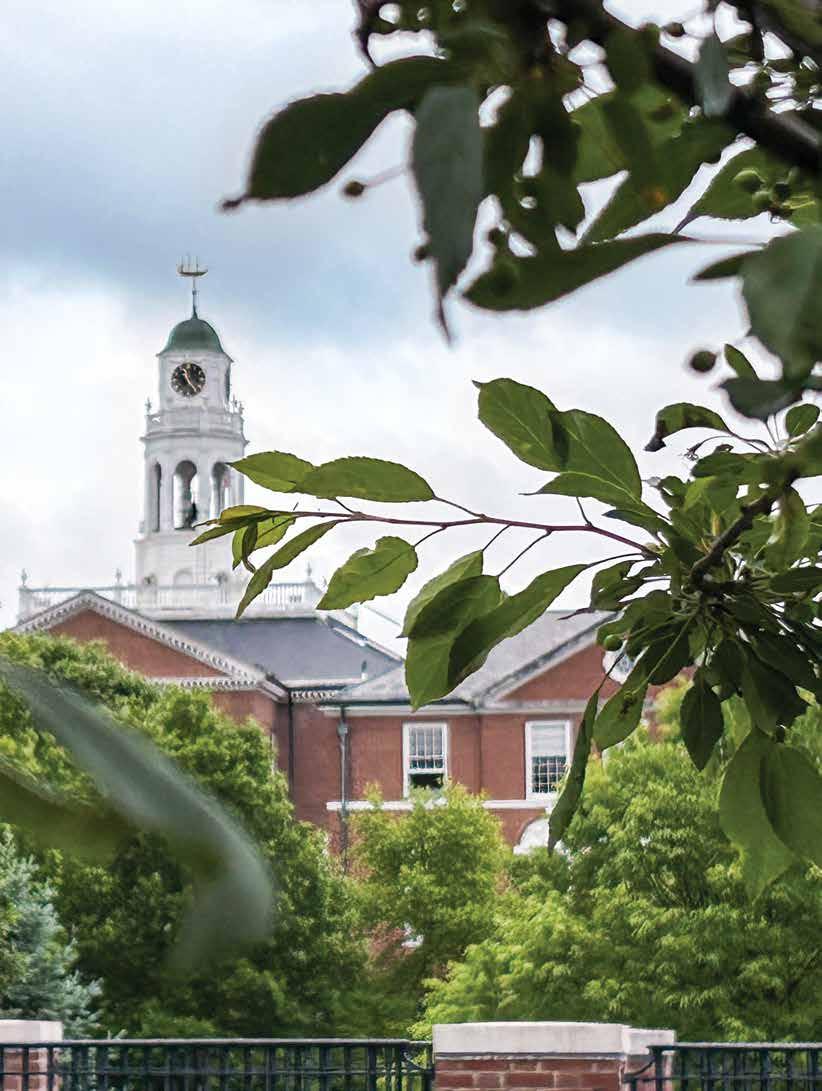
News and notes from the alumni community
In the vibrant tapestry of my life, a pivotal chapter unfolded in 1970 when I journeyed from the St. Nicholas projects in the heart of Harlem, New York City, to New Hampshire, to Exeter. This expedition, sparked by the encouragement of my seventh grade teacher, Bill Hefernan ’64, and fervently embraced by my mother, became the defning chapter of my life.
The socioeconomic disparities between the streets of Harlem and the privileged enclave of Exeter were stark. My parents borrowed a car from a family friend to drive me to the Academy. We were greeted warmly by the Snows in their apartment. My parents were invited to stay for refreshments. I could tell that my father felt unsettled by the whole afair. Truth be told, we all were unsettled. Their living room was half the size of our apartment in St. Nick. The culture shock was palpable. My parents could only stay for two hours because the family friend needed the car for work on his third-shift job. We had just enough time together to buy a watch and The 5th Dimension Greatest Hits (the only album that had Black people on the cover) at George & Phillips. With warm hugs and tender kisses, they said their goodbyes, told me to work hard, and began their fve-hour trip home. I was left to adapt to a world where afuence was commonplace and utterly otherworldly to me. I secluded myself in my single room on the fourth foor of Webster South and played my new album until I fell asleep. To this day, I am amazed that no one, adult or student, knocked on my door to check on me. I spent my frst night at Exeter, in this place with redbrick buildings, that were not the redbrick projects of my neighborhood. Hugo St. John ’74 knocked on my door the next morning, and that is when my journey and my frst friendship began.

the accompanying embarrassment posed difculties that demanded resilience and tenacity. The fear of disappointing my parents was my sole motivation in my prep and lower years.
However, amid the trials, the positive impact on my life was profound. The academic challenges became crucibles of personal growth, pushing me beyond perceived limits and instilling in me a passion for intellectual pursuits. Living and learning within a diverse community expanded my horizons, fostering an appreciation for diferent cultures and perspectives, even while discovering and embracing my own. This, in turn, became a source of strength in navigating a world that was far more intricate and interconnected than I had imagined.
My Exeter experience didn’t just cultivate academic prowess; it sowed the seeds of lifelong values. The pursuit of excellence was balanced with a commitment to service, encapsulated in the principles of non sibi. Looking back, my journey from the tumultuous streets of Harlem to Exeter was a voyage of self-discovery. The challenges I encountered were not roadblocks but steppingstones, and the positive infuences endured. The experience left an indelible mark, shaping not just my academic trajectory but imbuing in me the enduring values of non sibi and the art of listening, which continue to guide my path to this day.
As a serendipitous bonus, my Exeter journey introduced me to Vivian Haskin ’75, otherwise known as Ewunike (A-won-noo-kay) or Nini, the girl who would become my wife and life partner. This unexpected blessing and joy added a profound layer to my transformative experience, creating lasting connections beyond the academic and cultural realms.
The educational disparities were equally conspicuous. In a word, Exeter was hard, really hard. The curriculum was a demanding landscape, requiring intellectual acumen and discipline previously unexplored. At home, I never had to study. I could knock out my homework in an hour. In nine years of school, I never received a grade lower than 95%. I was a recipient of the Governor’s Citation for Academic Achievement. The transition from the conventional educational system in Harlem, even in its lauded class for the “intellectually gifted,” to the Harkness table, the D+s and
I am eternally grateful for Exeter. I am grateful for my teachers — all of them. I am grateful for my classmates and our time together at the Academy. I look forward to our reunion in May. E
Editor’s note: This refection was written as part of a series that members of the class of 1974 shared with one another over email in the months leading up to their 50th reunion.
Abhijay Bhatnagar ’17 wants one person to have access to your personal data: you. With that in mind, he and his brother, Arjun, co-founded Cloaked, a consumer privacy app that generates unlimited online profles to protect personal information. “When people ask for your credit card or Social Security number — that’s a visceral moment,” Bhatnagar says. “We want to work with the consumer to reclaim the value of their data.”
Corporation, where he collaborated on the development of health care information models as the company’s youngest-ever employee.
We caught up with Bhatnagar in Manhattan, where he shares an apartment with Arjun, a block from the Cloaked ofces.
What was the inspiration behind Cloaked?

Cloaked is not their frst startup: that was Hey, Heads Up!, a scheduling app the siblings developed during Bhatnagar’s freshman year at Exeter, and sold two years later. This year, the brothers were named to the Forbes 30 Under 30 list for Consumer Technology.
“I’ve always had this obsession with how to create value for the most people … and I like to build and tinker,” Bhatnagar says. “When you combine that engineering passion with this desire to do good, then creating a tech startup is sort of the natural inclination.”
He also credits Exeter with his development of grit, a key component of entrepreneurship. He was a member of the wrestling team and deep into STEM at Exeter and, he says, “having to juggle both really exposes you to having to stretch yourself in all directions.” This grit may have helped him land a post-Exeter position at the MITRE
Privacy is about the three Cs: comfort, control and consent. In health class at Exeter, you learn consent in relationships. People’s relationship with technology should follow a similar pattern. You want to have some level of agency with your relationship with technology and how it uses your data. Cloaked started with this idea of, what does it mean to have control of your data? We’re beginning at the point of comfort, where people understand the problem.
And what is the problem?
Tech gets better when it knows more about you, but people are disengaging with technology at a higher rate — shopping trends, consumer adoption and new technology are sufering due to privacy concerns. The greatest value is unlocked when you defragment this entire system, when you put all the data in one place and let it know everything about you.
How would that work?
We see three possible worlds: big tech or the government owns everything about you or you do. Part of our goal is creating a path for consumers to own everything about themselves. We’re rethinking data as a commodity in general, but in an approachable manner.
How do you convince consumers that their data is safe? Every time a user creates an account, their own data vault is separate from every other user data vault and separate from Cloaked itself as a company — and Cloaked as a company negotiates for access for that data from the data vault. We’re both sides of the equation right now, but our plan is to open this up so you as an individual can own your data and control who has access to it. We sell to customers as a provider of trust, efectively — we’re a consumer-frst company — but we don’t own your data. E
Down a rolling scenic lane in a New Hampshire town just 30 minutes from Exeter, in a studio tucked within a restored farmstead, Robert Mathews ’69 makes exquisite handmade shoes for customers around the world — just as he has for almost 50 years.
The idea might seem romantic, even antiquated, in an era of fast fashion. But Mathews’ shoemaking business is surprisingly forward-looking, ofering a model for sustainability and thoughtful consumption. The studio, along with his entire homestead, runs on solar energy powered by 85 panels installed along the roof of the 100-foot barn. The buildings include several antique timber frames, rescued and rebuilt by Mathews and his wife, Barbara.
Inside, Mathews crafts bespoke footwear by hand from a vast inventory including fne French and Italian leathers, and exotic materials like ostrich from South Africa. Each pair costs upwards of $1,500 but can last for a decade or even longer with repairs. The process starts with a personal ftting and molds of the feet from which Mathews produces a custom pattern. Clients then choose a design. His portfolio ranges from classic iterations of sandals, loafers, boots and oxfords to colorful brogues and elaborate Victorian ankle boots swathed in autumn leaves. For a frst-time customer, the entire process can take three to six months.
Shoemaking has long been a family trade, passed down from Mathews’ grandfather, who studied foot health and shoe design in the 1920s and ’30s. “He was ahead of his time in realizing that the shoes people were wearing were distorting their feet,” Mathews says. “He concluded that the more primitive types of footwear, like sandals and moccasins, are actually better for people’s feet.” Mathews, who is certifed in pedorthics, echoes that emphasis on biomechanics in his designs, though the artistic potential of the craft has always been most compelling to him.
At Exeter in 1967, Mathews explored all the arts, performing with the glee club and taking sculpture class with Cabot Lyford. He described himself as an “aspiring hippie with long hair, homemade bell-bottoms and a countercultural bent.” On the side, he sold handmade sandals at a craft store downtown.
Mathews was accepted at Middlebury College but deferred enrolling for a year after graduation in 1969. He

spent three months hitchhiking through Europe, ending up in Matala, Greece. There he met folk musician Joni Mitchell, who was renting a cottage on the beach. “She imparted some words of wisdom to the efect that ‘Happiness is elusive. If it fnds you, follow it,’” he says. “So I did.”
He returned to the U.S. and attended Middlebury just long enough to meet his future wife, Barbara Good. He soon left college, fnding the experience unchallenging. After Barbara graduated, they married and moved into an old farmhouse in Deerfeld, New Hampshire, with a woodstove, an outhouse and well water, retrieved by rope and bucket. “We joined the ‘back to the land’ movement of the era,” Mathews says, “growing our food and milking a cow.”
As their three children grew older, the couple put more energy into shoemaking. Barbara became the business manager, arranging exhibitions at prestigious places like the Smithsonian Craft Show in Washington, D.C. They became regulars on the craft show circuit, building a loyal following of clients that keeps them busy to this day. “We always encourage people to come to the studio in person, if they can,” Mathews says. “It’s a tricky business to ft a shoe to somebody. You have to get a feel for what they like and don’t like.”
Next year will be the couple’s 50th year in operation. “We’re slowing down a little,” Mathews says. “Getting to the point where I don’t mind slowing down a little.” Many clients will be disappointed when he retires, but his seven grandchildren are making growing claims on his time. “They love visiting here,” Mathews says. “We provide them with a safe haven — lots of open space around our country life.”
Consider the shoemaker’s happiness found. E

One fall morning in 2001, preoccupied with the prior night’s homework, Zoe Brennan-Krohn ’03 walked across campus for assembly. Sliding into a seat in Assembly Hall, she was reminded that assemblies did not always feel very meaningful. Often, speakers reminisced that Exeter had been the best time of their lives. Brennan-Krohn, an upper, wasn’t sure she shared that view. Exeter was complicated. She was a diligent student who stayed on top of her classwork and other commitments, but she also felt overwhelmed and homesick. It didn’t help that her friends and peers seemed to have an easier time keeping up with everything.
The speaker that morning was diferent. He was Patrick Lydon ’68, a recipient of the John and Elizabeth Phillips Award for his work establishing Ballytobin, a 14-acre farm and residential community in Ireland for people living
with intellectual and physical disabilities. Lydon became emotional as he told stories about the children and adults who lived there, farm life and the loyal co-workers — all, like Lydon, unpaid volunteers who helped make it all work. Brennan-Krohn was struck by his fond description of a life that was chaotic and full of surprises — very diferent from her own, which felt more about striving and order. Lydon spoke eloquently about his view that all people should feel whole, respected and supported to fnd their places in the world. “Patrick presented himself with honesty, vulnerability and rawness but along with a very clear, sharp intellect and critique about society’s treatment of people with disabilities,” Brennan-Krohn recalls. “It just drew me in.”
What if, she wondered, being an academic super achiever wasn’t essential to who she was? She emailed Lydon after assembly and accepted his invitation to
volunteer at Ballytobin the following summer. Her experience was so profound that she returned after graduating from Exeter and stayed for two years, postponing college.
Now the director of the ACLU Disability Rights Program, Brennan-Krohn represents deaf and hard-of-hearing prisoners in Georgia to secure services like hearing aids and sign language interpreters. She’s also an authority on legal guardianship and conservatorship. “I think a lot about how to make space for my clients in our society, no matter how troubled their lives may be,” she says. “Making that space in our hearts means being in proximity to them.”
Proximity was the point at Ballytobin. Brennan-Krohn and other volunteers lived alongside the people with dissabilities, providing direct care support and also a shared life together. Prior to her arrival, she knew nothing about farming, cooking or working with people with disabilities. “There was a lot about being there that I didn’t know,” she says. “But that was accepted.”
She became adept at making pizza for Wednesday lunches and harvesting vegetables from the garden. But providing direct care support for the young people with disabilities, despite her inexperience, was the most rewarding. She grew especially close to Aiden, a teen with cerebral palsy who didn’t speak or use sign language. They communicated without words, often working on an activity or simply sitting together.
“It was such a contrast from what I thought I had to ‘be’ to succeed,” BrennanKrohn says. “I learned that being smart and intellectual is one way to be with others but not the only way. My way of being with Aiden was completely diferent and undeniably real.”
accountable for war crimes and human rights violations. Her passion for disability rights brought her back to the U.S. and the ACLU Disability Rights Program. In her prison work, her clients are disproportionately people of color and are excluded not only from society, but also within the prison system, because of their disabilities.
“People with disabilities are overrepresented in the prison and jail system because their disabilities aren’t taken into account,” Brennan-Krohn says. “They don’t get the supports they need, which can lead them to prison or jail, where they end up staying longer because there’s still no support to help them.” She adds that getting to know her clients and gain their trust has been “incredibly rewarding.”
In 2021, when singer Britney Spears’ struggle to end her father’s control of her personal life and fnances made headlines, Brennan-Krohn found an opportunity to draw attention to the issue of guardianship, a lesser-known but important disability rights issue. Legal guardianship (or conservatorship) gives a person, usually appointed by a court, the legal authority to make decisions for someone else.
“I learned that being smart and intellectual was one way to be with others but not the only way.”
Tempted to stay in Ireland, Brennan-Krohn twice deferred enrolling at Brown University. When she did return to the U.S., the transition to college was disorienting. A history major, she drew on her Ballytobin experience to write a detailed history of the community’s umbrella organization, Camphill Communities, for her senior thesis.
After graduation, Brennan-Krohn went to Bosnia on a Fulbright scholarship to teach English at the University of Banja Luka (“I stayed there for a year, then a second year,” she says. “I have this habit of staying places longer than I’m supposed to.”) She was drawn to pursue a career in public service and enrolled at Harvard Law School. At Harvard, she initially focused on international law. Between her frst and second years of law school, she interned for the United Nations International Criminal Tribunal for the former Yugoslavia at The Hague, working for the president of the tribunal designed to hold people
“It’s literally stripping someone of their civil liberties because of their disability,” Brennan-Krohn says. Many people with disabilities get assessed by a judge at age 18 to determine if they can take care of themselves. “Most of us are still learning at 18,” Brennan-Krohn says. “How would we fare if we were put in that position?”
She fled amicus briefs supporting Spears in a California court and testifed before Congress, outlining the dangers of conservatorship and presenting alternatives (including supported decision-making, which allows people with disabilities to choose who helps them make choices). Despite Spears’ wealth and fame, her experience with conservatorship was “so typical,” Brennan-Krohn says. “She got placed in conservatorship at a moment of crisis and couldn’t end it.”
Brennan-Krohn recently returned to Exeter to speak at assembly about Patrick Lydon and her experiences at Ballytobin. But the situation there has changed. Lydon, whom she remained close to, died in 2022. Ballytobin still exists but is no longer part of the Camphill Communities. Brennan-Krohn is still an achiever, but that doesn’t defne who she is.
As a flm crew captured her remarks for a documentary about Lydon, she refected on his legacy. “Patrick talked about creating a space in your soul to include what can’t be included,” she says. “Making that space for people whose values are diferent from mine changed me.” E
When you enter the Winter Street Cemetery west of Exeter’s campus, you become immersed in a tangible sense of time. Weathered tombstones lean at odd angles, their inscriptions, faded by time, moss and lichen, make them almost illegible. Among them, I found the grave of John Taylor Gilman, a former governor of New Hampshire, who died in 1828. His name was engraved on a large marble stone whose cracks laid bare two centuries of decay.
John Taylor Gilman and his brother, Nicholas, who signed the U.S. Constitution, embodied the spirit of American innovation, leadership and commitment to public service that had defned the nation’s character. As America is engulfed in a tumultuous period of political change, I found myself contemplating how our values, the values that defne the American character, have changed too.
Within the centuries of established New England elite who fll the cemetery lies a diferent tale of American history. The Evening Gazette in 1898 described the Winter Street Cemetery as an “old burying ground … surrounded by a two-board fence with two gates, one on Front Street for white people, and one at the back for colored people.” Today, the fences and divisions have disappeared, a symbol of the continuing social progress in our country.
Perhaps even more striking was a polished stone standing in the far left corner of the cemetery. As I walked closer, the engraved name Jude Hall came into view, followed by a brief biography: “Born ca. 1760. Slave of Philemon Blake of Kensington. Fought in Battle of Bunker Hill, served till the end of the Revolutionary War, 1783. Married Rhode Paul, 1786. Lived as a free man on Drinkwater Road Exeter. Died ca. 1827. Buried in this yard. This stone erected A.D. 2000.” Two centuries after his death, the story of Jude Hall exemplifes the racial tensions and struggles throughout American history.

Two weeks before my visit to the cemetery, I voted in the New Hampshire primary. Performing my civic duty to engage in the democratic process of the United States, I felt a sense of pride for how far we’ve come. I could stand in front of the grave of an enslaved American, Jude Hall, and truly believe that if he saw America’s new cultural dynamic, he’d fnd an imperfect but far more welcoming world to live in. Countless immigrants have set foot on American soil, my parents among them, seeking a new beginning, bringing into focus the enduring promise of the United States. It’s a promise that, despite its imperfections and the ongoing struggles for equality and justice, ofers a foundation for hope.
But today, our hope for the continuation of the fragile democratic values that the founding fathers sought to instill in Americans is fraying as we face a new crisis. It’s hard to pinpoint why our country’s divisions are growing. What has become clear to me is the self-perpetuating cycle of divisive rhetoric and actions that permeate today’s political spectrum. It is within this division that my vote in the New Hampshire primary was one of both impassioned hope and fear: hope for the continued success of our country’s values and its unprecedented economic prosperities; fear from the ever-present danger of the corruption of our democracy. We should all have a keen interest in preserving what it means to be American, to uphold the values of democracy, freedom and unparalleled individualism that transcend the individual.
John Taylor Gilman, Jude Hall and many millions who represent the American past fought for the values that they believed defned America. And as I walked through these storied markers of our history, contemplating the sacrifces they made to do their jobs, I felt a profound sense of duty to do mine. E
Editor’s note: Charles Gao ’24 wrote this piece for a winter term class, ENG583: Stranger in a Strange Land

Phillips Exeter Academy seeks to graduate young people whose actions and ambitions are inspired by their interest in others. As part of a lifelong commitment to non sibi, many alums choose to put Exeter in their wills.
Meet your fnancial goals and support generations of future Exonians with a lasting gift to the Academy.

Nominations